After secretly eloping in 2017, two West Point graduates look back on building relationships with each others' families, and look forward to the lessons they'll carry from the Army to their futures.
Mike + Ciara // Savannah, Georgia
Author’s note: because of last-minute complications with travel amid the pandemic, I was unable to photograph Mike and Ciara’s wedding. All professional photos in this piece are the work of Gerome Ogeris. Thank you, Gerome!
On a sunny Thursday afternoon in September of 2017, as Ciara rode with Mike in his car through downtown El Paso, she suddenly asked a question: “You're not trying to get married, are you?”
The two had been classmates at West Point, but didn’t truly connect until after graduation when, during a trip to Washington D.C., they changed from friendly acquaintances to spirited lovebirds in less than 48 hours. “I don't really know what specific moment it happened,” Ciara said, “but we were just friends before, and then things took a huge change.” She and Mike began dating in March of 2017.
Ciara was visiting Mike, who was stationed at Fort Bliss, when she asked the question about marriage. “It was a sort of ‘hook and bait,’” Mike said, “and I took the bait.” A wide grin spread across his face as he recalled his response. “I was like, ‘Yeah. I'm ready.’” Mike asked two of his friends if they could take a few hours off from work the next day to be his and Ciara’s witnesses, and the two dressed as casually as they decided to get married: Ciara wore blue jeans and a white off-the-shoulder blouse, and Mike wore a button-down with khakis and comfortable loafers.
Mike and Ciara shortly after they were married at the courthouse in 2017
“I remember trying to find a place to park outside the courthouse,” Ciara recalled, “and seeing another girl in her wedding dress and kind of thinking, ‘Hm, maybe I didn't quite prepare enough…’” 45 minutes later, the two were married, and because Mike’s friends had to return to work, he and Ciara celebrated by themselves over lunch. (When I asked if they remembered where they’d gone to eat, neither could actually recall.)
Their relationship, just shy of six months in length between dating and marriage, and just a few hours in length of “engagement,” was the shortest of any couple I've worked with thus far for Portrait of a Young Couple, and Mike and Ciara readily admitted that their decision to get married was somewhat impulsive and made at the height of their optimism. But they also voiced a steadfast confidence in their choice. "Sure, there were some things that we didn't consider at the time," Ciara said. "But we were in love, and we'd literally talked about everything under the sun. It felt like we were so connected on everything that, even if we ran into issues, together, we'd figure out a way to solve them."
Ciara and Mike together when they were dating
That Ciara said “if” instead of “when” perhaps is the best evidence for her and Mike’s optimism; in the three years since eloping, the two have indeed run into their share of issues, building relationships with each others’ families where none existed before, communicating with one another amidst intense grief, and, most recently, planning a wedding during the COVID pandemic.
Mike and Ciara, of course, took precautions to ensure their friends and family would be safe at the wedding; they shrank their guest list, shortened the ceremony, and extended forgiveness to those who still didn’t feel comfortable attending. But they also never outright considered canceling the event, as so many other couples decided during the pandemic. “In the Army, death and being in harm’s way is a part of the job,” they wrote to me about a month before the wedding. “Yearly deployments are, too, so the likelihood that we don’t have a time like this together for the next five years is high. We never know what tomorrow holds, so we’re big on living today. We are 100% still having the wedding.”
Mike and Ciara are both Field Artillery Officers in the US Army, tasked with “leading the branch that neutralizes the enemy by cannon, rocket, and missile fire.” As First Lieutenants, they’re responsible for leading a Platoon of soldiers, comprising anywhere from 20 to 50 enlisted men and women, and they treat that responsibility with both incredible deference and incredible humility.
Unlike the military officers of media or lore who proudly display autocratic tendencies, neither Mike nor Ciara sees their work through such a dictatorial lens. "Maybe 2% of the time, you're telling someone to do something and they have to do it, like, right now," Mike told me. "But the other 98% of the time, you can have a conversation. You can talk, get the most information possible. Because you're not going to be a good leader just by telling people to do stuff."
Ciara and Mike together before one of Ciara’s promotions
They shared about how their leadership philosophy often differed from that of other officers who had also attended West Point. "My first experience of seeing the difference between the West Point officers and enlisted men was when I showed up to my unit at Fort Bragg," Ciara said, "and they were discussing doing Physical Training with swimming sessions the next morning. I think I was the only one who asked at the table, ‘What do we do if a soldier can’t swim?’ And the others kind of laughed, and were just like, 'Who can't swim?'" (Over 50% of the US population, in fact, according to a Red Cross survey from a few years ago.)
Mike, likewise, told me about his soldiers’ reactions when they found out he came from West Point. "I'd tell people I'm a West Pointer and they were surprised, not because they were surprised that I was smart, but because they were surprised that I wasn't a jerk, and that I didn't look at them like roaches."
Mike with one of the soldiers he commanded
Being officers in the US Army has taught Ciara and Mike a prodigious amount about life and human nature; resilience and discipline are unsurprising qualities they've refined. "You learn what it takes to survive, and to do whatever it takes to accomplish what you're doing," Ciara said, noting how the military, like any organization, was formed by people with different perspectives, and that leading those people requires performing a constant loop of analysis, action, reflection, and change. It also requires, for Ciara, a genuine respect for the humanity of those under her command. "I've tried to keep truly caring for people at the forefront of my work, because my soldiers can't effectively do the jobs I'm asking them to do if they're not feeling 100% supported," she said.
Mike shares a similar perspective, and told me an illustrative story about a soldier he used to command. The soldier’s grandmother, who raised him as a child, had suddenly passed away, and though the soldier obviously wanted to pay his respects and help bury her, he didn’t have the money to fly to her funeral. When he asked Mike for help, Mike in turn asked others for their opinions.
“First and foremost, don't give that guy any money, because you're probably not going to get it back,” an NCO had told him, “and second, that soldier didn't do the paperwork to say that his grandmother was basically his guardian, so he could be totally making it up.”
To Mike, the NCO’s perspective felt terribly cynical; why would a soldier make up the death of his grandmother for just a few days of leave? Mike, as the soldier's direct officer, ultimately had the power to make the final decision. He ignored the advice he received, granting the soldier leave to bury his grandmother and even lending some money to pay for the flights.
"Fast forward,” Mike continued, “and the soldier paid me back and also ended up getting promoted despite being seen before as a troublemaker. I think he realized he finally had somebody in his corner, somebody who was for him." Mike respected the people who had given him advice, but he also realized how taking that advice could've forever made the soldier bitter towards him or the Army, hampering their willingness to contribute to their team and, more fundamentally, obstructing their sense of happiness and fulfillment.
"If everybody had more of an optimistic mindset instead of a pessimistic one, how much different could the military be?" Mike mused.
Unlike many of their fellow officers who are the latest entry in a long genealogy of military service, neither Mike nor Ciara come from military families, their paths formed more by the practical draw of tuition-free school and a successful career than by any particularly impassioned sense of patriotic duty.
Mike’s parents are Nigerian immigrants who came to the United States with the understanding that opportunities only came to those willing to work for them; you needed to work, and fight, for every inch of life. "My mom used to tell me stories of how she'd want to go to school as a kid and her father saying 'If you go out to the market, and you make 1000 Naira, only then can you go to school.'", Mike told me. His mother’s fiery intellectual spirit, doused by her family’s financial instability, led to her and Mike’s father to prod their four children towards careers in medicine and law, and firmly grip the academic opportunities they themselves never had.
Mike (front in the white shirt) with his siblings, their mother (woman in red behind Mike) and her siblings (left and right)
After moving to the US, Mike’s father worked towards a law degree while Mike’s mother worked food-service jobs at KFC and Church's. Both had long hours, and Mike recalled rarely spending meaningful time with either as a child; his oldest sister, Chi Chi, saddled much of the responsibility of taking care of her three younger siblings and setting an example for them. (She attended Yale after excelling academically and athletically in high school.)
Mike (right) with his sisters and mother
With his older sister’s blueprint for success in hand, Mike built his life accordingly, playing football at a high level and doing well in school. Success was the expectation, not the exception, within Mike’s family, evidence by his parents rarely attending any of his games or award ceremonies. He acknowledged this fact without spite or longing. "It never really bothered me that my parents weren't there," he told me, "because I was succeeding at what they expected me to do. Why would my parents give me a pat on the back for something like getting a 3.5 GPA? I'm supposed to be doing that.”
Mike with his mother at his high school’s Senior night
He credited some of his parents’ mentality to their immigrant background, and specifically how success and survival, not happiness or fulfillment, drove their decision-making. "Culturally, it was kind of like, 'We're here. Now we have to do whatever we need to do to succeed,'" he said. When they first moved to Atlanta, Mike’s family lived in a rough area of the city near where the Georgia Dome used to be, but over the next two and a half decades, they steadily worked and moved to safer and wealthier neighborhoods. "I think that's just a testament to my parents wanting better and better for themselves," Mike said.
Mike (right) with his brother at a baseball game
Mike described himself as being a loner early in high school, with an attitude of self-reliance at once independent and hubristic, and he may have never changed were it not for a pair of early mentors.
The first was a man by the name of Kevin Taylor, who, "explained to me that I can't make it on my own, and that there are people in the world willing to help." The second was a man named Sergeant Major Carter, whom Mike met through Junior ROTC. "My friends and I were sitting in his office one day, and he asked us, 'What are y'all gonna do after high school?' And my friends were kinda just like... 'We don't know.'"
Mike’s friends' lack of answers jolted him, because although he also didn't have an exact answer, he at least had plans, and an understanding that all of those plans required hard work. "That's the first time that I realized what kinds of friendships I wanted, because it wasn't that," he told me. "We weren't helping each other realize our potentials, and that's when I learned not only that others could influence me, but that I could influence them, too. That we could all help each other realize what we're truly capable of."
Mike (center) with Sergeant Major Carter (left) in high school
As he considered his options for college, football afforded him two choices: a large public university, like Tulane or East Carolina, or a military academy, such as West Point, which his older brother also attended. Mike's choice was lucid. "In my mind, if I went to one of the state schools, it'd be football or nothing afterwards," he said, "while if I didn't necessarily make it in football after one of the military academies, I'd still be setting myself up for a future where I could get a job and be able to provide for my family."
Mike initially worried whether he’d be able to shoulder both the physical intensity of playing football and the academic rigor of attending classes at West Point, but a family friend who'd attended the Naval Academy assured him of a simple fact: "At the end of the day, whether you graduate first, or graduate last, you're still going to be called the same thing."
"A graduate of West Point?"
"Sir."
The United States Military Academy, known culturally as West Point and colloquially as The Academy, is one of five service academies in the United States dedicated to developing young men and women into officers for the US Armed Forces. Where other universities extend an inexhaustible stream of grand, often pompous, self-accolades about their goals and ideals—think "educating tomorrow's leaders" or "molding civically responsible humans"—West Point is far clearer in its aims and methods: to develop classes of highly capable officers for the US Army through a physically, intellectually, and emotionally demanding four-year undergraduate education.
Aerial photo of West Point. Credit
West Point is a symbol as much as it is a school, shaped by the traditions that govern life there and the long shadow of its eminent alumni in military and civilian organizations. Four out of the five five-star Generals of the Army were graduates of West Point (MacArthur, Eisenhower, Arnold, and Bradley) and dozens of Fortune 100 companies are or have been led by its alumni.
Constructed first as a military outpost during the Revolutionary War, West Point's campus sits on a triangular outcrop of land on the western bank of the Hudson River about 50 miles north of New York City. Most of its buildings are constructed from a light-grey granite which, whether seen as gloomy or austere, undeniably suits the serious nature of the institution.
In concept, West Point operates much the same as one of its civilian counterparts; students take classes, play sports, and form lifelong friendships just like at any other university. But in detail, a distinctly military flair imbues every bit of daily life; students are referred to as cadets, divided into Companies instead of advising groups; showers and dining are communal; and displaying a cleanly creased and tucked uniform is required in nearly all public settings. Upon graduation, each cadet is commissioned into the US Army as a Second Lieutenant and is required to serve at least five years of active duty service and three years of reserve service in exchange for the privilege of receiving their West Point education for free.
A set of barracks at West Point. Credit
Since 1794, the Academy has educated its cadets in four "pillars": Academic, Military, Physical, and Character; all cadets graduate with a Bachelor of Science regardless of their chosen "major," take additional military-focused classes with names such as Introduction to War-Fighting and Platoon Operations, practice regular physical training, and pledge their honor to academic integrity and strong individual character. All of this is designed to create leaders who can think critically under constant pressure, which Ciara admitted to me that she wasn't initially ready for.
Like Mike, Ciara hadn't grown up dreaming of attending West Point. She was born in North Carolina, where her parents met during university at UNC Pembroke. Her father studied Criminal Justice while her mother studied English, and both were the first in their families to attend college.
Ciara was born when her mother was still in college, and her parents’ relationship ended soon after graduation. But unlike the experience of many children who grow up with separated parents, Ciara rarely felt awkwardness or conflict between mother and father. "I remember the transition being difficult, with them trying to figure out co-parenting," Ciara recalled, "but both of them always knew I was the priority. I was in a loving environment with both of my parents." She described how her they maintained a healthy friendship, even after they eventually married other people. "My parents and step-parents are an extremely functional family. We hang out all the time and love to talk, cook, and play games together."
Ciara with her father
Ciara is particularly close with her mother and grandmother, whom she lived with for most of her childhood; she still talks to them almost every day over FaceTime. When I talked to her grandmother about the home she was raised in, hoping to in turn learn about the indirect influences Ciara grew up with, she told me, "I and my six sibling were basically raised by a single mom in a Christian home with rigid values. She taught us to be strong and not depend on others, so I raised my daughter, Ciara's mother, to be a strong woman. When she had Ciara, she instilled the same thing in her. We're a family of strong women who will stand up for themselves."
Ciara (bottom) with her mother (right) grandmother (top) and great-grandmother (left)
If Ciara’s sense of independence came from her mother, then Ciara’s sense of how to apply that independence in productive ways came from her father. "My dad loved to say that ‘idle time is the devil's workshop,’" Ciara said, "and he put me into basketball as early as he could. He was like, 'You're tall, so we'll see how it works for you.' And I loved it." The YMCA league she joined that first year went undefeated, and Ciara thrived off of the energy of being a part of an organized sport.
Encouraged by her parents’ broad appreciation for success by many definitions, Ciara grew up with a large and ever-changing imagination of the career she’d pursue. One week, she’d want to be a scientist; another, a detective; eventually, she landed on law for the way it could be used to defend people without their own power or privileges. "Ciara is a person who loves people and being around them,” her grandmother told me, “and who will scoop you up in a group if you ever feel like an outsider to make sure you feel included."
Ciara's college strategy was to use basketball as a tool to get into Elon University, located near the center of North Carolina, where she'd study Criminal Justice before applying to law school. But when another girl from her high school basketball team got recruited first, taking the same spot Ciara wanted, a different opportunity took its place: Elon's women's basketball coach, who liked Ciara but couldn't take her for her own team, put in a good word to her counterpart at West Point.
Ciara's grandfather had been in the Air Force, but he rarely talked about his service, and the rest of Ciara’s family had no connection to the military. "I didn't know anything about West Point," Ciara said, "so I started to research it, and saw all the opportunities that it afforded: being able to help people, having a job as soon as you graduate, making a decent amount of money." She admitted that she didn't know exactly what she was getting into. "I think the coach helped make it seem a lot brighter," she said.
At first, Ciara’s family were entertained by her interest in West Point. "I used to do ballet," Ciara told me, "so the concept of sleeping outside would crack my mom and her friends up. They'd be like, 'No way is Ciara going to sleep under a tarp. That's not her!'" (They were partially right: Ciara hated the first nights she and the other cadets had to sleep under the stars during basic training.)
Ciara had a rough start at West Point; she credits an older friend of hers named Todd with often saving her from embarrassment. "There were plenty of days when I'd walk outside and my uniform was messed up or I'd forgotten something, and Todd would just be like 'Jesus, Ciara, go get yourself together and fix this!!'"
Ciara in her full dress uniform
She majored first in Systems Engineering because a friend told her it was "easy to get good grades and the teachers are good," but had no motivation to study in the evenings and or to stay attentive during the days; apathy led her to fail a Chemistry course, which in turn triggered a review by West Point's academic board, a group of professors and mentors who decide a cadet’s penalty for failing a class. Ciara's board ruled that she would have to stay an extra year.
Ciara told me about when she once called her grandmother amidst the overwhelming pressure and stress. "I think it was around my birthday," she recalled, "and I remember crying to my grandma because I was struggling, saying to her 'I'm failing, I'm tired, I can't do this anymore.'" Ciara expected words of encouragement and confidence; instead, she got an easy way out. "My grandma just replied, 'Well, that's okay! You can come home if you want to.' And that was like, the weirdest thing to say to me in a moment like that."
Ironically, her grandmother's reassuring words that it was okay to fail and quit gave Ciara the motivation to persist a little longer. She hit her stride towards the end of her second year when she felt a crescendo of solidarity with her basketball team ("I remember the adrenaline and excitement of playing Navy or preparing to go to the NCAA Tournament,” she told me), switched from Systems Engineering to Pre-Law to better align her major with her interests, and participated in organizations like the campus gospel choir or a STEM outreach group that made visits to local high schools to teach robotics. "I just met some really cool people, decided to stop spreading myself so thin, and do things that I actually enjoyed," she told me.
Ciara (center) with some of her basketball teammates
Mike's own introduction to West Point was arguably just as challenging as Ciara’s, tempered only by his first attending a year of the Academy’s Preparatory School, an environment designed to give athletes an extra year to train before joining the varsity teams, or to give unprepared students more time to transition into the Academy’s intense academics. Mike attended for both reasons; he was recruited to play for the football team as a defensive end, and he'd also failed a class in high school. ("I think I got, like, a 13/100, and there was no real explanation except that I just forgot I had the class, but the rest of my GPA was really good,” he told me, smirking a bit at how absurd that sounded.)
Mike (giving a thumbs up) at West Point’s Preparatory school
Despite the extra time “prep school” (as it’s colloquially called) gave mike to prepare for entry into the Academy, he still struggled when he arrived; the first two years of math and science were particularly challenging. "I'd get punched by math over and over again, and then science over and over again, and all this is happening when I was trying to also absorb football, and I just said to myself, 'Oh, this... this is out of control,'" he told me.
Splitting energy between his academic and football careers, Mike found himself falling short in both. But, as with Ciara, his performance and mood improved over time; he switched majors from Chemistry (a remnant of his parents’ prodding towards STEM careers) to Business Administration, and played better and more often in football, too.
Mike playing football for West Point
By the end of their years at West Point, Mike and Ciara had both grown immensely. Their next step, like that of all the other cadets, was to learn what roles they’d fill for the Army after graduation. West Point uses an algorithmic system with four inputs—academic class rank, physical fitness, leadership potential, and the Army's needs—to determine what sub-branches of the Army cadets will be commissioned into, ranging from Technical, like Engineering or Cybersecurity, to Combat Arms, like Infantry or Armor.
The fourth input (the Army's needs) is arguably the most important in determining where a cadet will be assigned, and because of it, Mike and Ciara all but knew that they would enter Combat Arms—roles within the Army directly responsible for fighting. They also guessed, correctly, that they would be assigned to Field Artillery. "My year, they told us that 76% of us were going to Combat Arms," Ciara said, "and because the Army also wants diversity within the different branches, it was pretty likely that I was going to go to Field Artillery." The trend, Ciara saw, was that most other Black female athletes were being assigned to Field Artillery, and that she would join them, too.
Mike, similarly, knew his path through his affiliations. "There's a joke that FA doesn't just stand for Football Alumni; it also stands for Field Artillery," he said. It was nearly even taboo, Mike told me, for a football player to consider doing anything else. "The perception was that guys who play football are supposed to be leaders, and if you're a leader, you should go lead from the front," Mike said.
Mike (grey uniform) with his family at graduation
After graduation, Mike spent a year as a Graduate Assistant for the school's rugby team, liaising between the team’s civilian coach and school’s military leadership. (He originally also aspired to train that year for the US Olympic Ruby team, but dropped that when he "realized my body was just breaking.") After, he went to Fort Sill in Oklahoma for Basic Officer Leader Course, or BOLC, where he learned the particulars of how to actually be a Field Artillery Officer: using weapons in the arsenal, studying strategies for leading Field Artillery missions, and receiving more general training on how to lead well.
Beyond the classroom, as Ciara described to me, "a lot of how the Army operates is by learning and teaching on the job." Being an officer, she said, involves managing both down (towards NCO’s or enlisted soldiers) and up (towards higher-ranking officers, whether Captains, Majors, or Generals.)
Ciara also attended BOLC in Oklahoma after graduation, and filled her first station at Fort Bragg. Her days began with a few hours of physical training with her soldiers, followed by showers, breakfast, and a workday that in many ways looked similar to a civilian job: a few hours of "meetings that could've probably been an email," and a few more hours doing actual work with actual soldiers, briefing them on their next assignments or running trainings for weapons proficiency or miscellanies like radio usage.
She enjoyed her first experiences being a platoon leader, and took pride, too, in the symbolism of her post. "There's not many Black women in Combat Arms," she told me, "so the likelihood that I was the first Black woman to take command of a unit was always high.” She shared a bit about how that symbolism translated to her daily emotions or thoughts. “Depending on the day or month, I might be leading the charge of being a female Black officer in a Combat Arms unit, and being the one who’s gonna break down barriers, or deciding that I like my mental health better, and that I'd rather be peaceful at home doing something else. I'm leading the charge, or I'm at home need just five minutes of silence.”
“But, I am proud to have gone gotten this far, and I feel as though I've affected a lot of soldiers and people in ways that I hope that they'll take with them through the rest of their lives.”
Ciara with one of the soldiers she commanded
Mike and Ciara were friends well before they found a romantic interest in one another. Their first memories together are from their General Chemistry class at West Point, and though the two were friendly on campus, they weren't close, and lost touch for a year after graduation. It was only after Mike sent Ciara a message on her birthday in 2016, wishing her well, that they reconnected.
Before long, they made plans to meet up in Washington D.C.. Mike was already there to visit a mentor at the Pentagon, while Ciara was already there to visit some friends, who playfully teased her about Mike. "One of them asked me if I could see myself being with Mike,” Ciara said to me, “and I remember being thrown off and replying, 'Of course not. It's just Mike. Like, we're just friends.'"
Her appraisal turned out to be wrong; over those few days together, she and Mike found an unexpected connection. "We had these long, awesome talks," Ciara said, "and in a weird way, dating kind of came naturally at the end of that weekend, even though that wasn't our plan at all."
Mike and Ciara after they began dating
They told me about how sharing music with each other deepened the early connection they felt: John Legend’s Ordinary People, Lauryn Hill’s Ex-Factor, and Allen Stone’s Barbwire came to mind when I asked if they had any favorite songs together from that time period. "We came to understand each other differently than most people because of our choice in music," Ciara told me. "He would send me songs that I wasn't as familiar with, and I'd listen to them and be like, ‘Wow, I don't know anybody else who would've sent me a song like this.’" The harmonies embedded in their music tastes sang far deeper than just pretty voices and catchy melodies; they became a way for Ciara and Mike to understand the nuances of each other's lives.
Before Ciara, Mike had seen all his relationships, both romantic and platonic, as somewhat transactional. The perspective he'd developed in high school for friends—how they served as a mutually beneficial aid towards personal growth—continued in college, and the same concept applied to his romantic partners; marriage had always been a far-away and irrelevant idea. "My mindset was that this person was going to help me become better, and I was also going to help them become better too, but that marriage was never in the future,” he told me.
Ciara, though, was different. “She was the first girl where I did think about marriage, and that's what helped solidify my mindset,” Mike said. “I knew that weekend in Washington D.C. that I wanted to marry her."
When I asked about if he harbored any fears or doubts about a speedy marriage, he replied, "I wasn't nervous at all, really, because I was coming from my family and our Nigerian cultural construct, where arranged marriages are a big thing. In an arranged marriage, you meet a stranger, and then you figure out how to love that person." Compared to that, Mike felt that the love he and Ciara already shared was leaps ahead.
Ciara and Mike after they began dating
Ciara, however, sheltered more worries, particularly in hiding the marriage from her family and friends. Not only was Ciara incredibly close with her mother and grandmother, she also described herself as a "daddy's girl" as her father's only child. "He loves really, really hard,” she told me, “and I know that a lot of that comes from how he grew up; not really having his own dad around, being really poor, having a bunch of other siblings.” She and Mike never intended to keep their elopement a secret for long, but as they delayed the news, weeks turned to months and months turned to a year, each passing day becoming more awkward to break the news than the day before.
Ciara finally told her family and friends about being married in 2018, prompted largely by wanting advice for communication issues she and Mike were having. "I found out through my daughter," Geneva, Ciara's grandmother, told me. "She said 'Mom, you need to come over to the house.' And I came, and Ciara looked like she had been crying. So I'm saying, 'What's the matter, baby?' And Ciara just choked up when she said it."
"There was disappointment," Geneva admitted, "mainly from feeling, 'why did you keep it a secret?' We've never been that way, and it was very hurtful, that she felt the need to keep it a secret. But once she did tell us, I was thinking it didn't matter anymore; she's grown, and she knows right from wrong."
Ciara video calling her grandmother the morning of the wedding
Deyonna, Ciara's best friend since middle school, expressed a similar initial affliction. "Ciara is my sister, and she's the first person I've called when things happen to me," she told me. "I have a shoebox full of notes that we would write each other back and forth in middle school, and even when we didn't talk as much when Ciara was at West Point or deployed, we'd write letters, and be able to pick up as if no time had passed when we saw each other next."
Ciara with Deyonna
"One day," Deyonna continued, "she was like, 'I need to talk to you.' But she kept avoiding me, ending calls, short texting, and I know my best friend so I'm like, 'What's up?'" Deyonna eventually just guessed what the issue was. "I finally asked her, 'Are you already married?' And she said 'Yes.' And we were on the phone, but my mouth dropped and it got quiet." (Deyonna had just helped Mike with what she thought was the proposal a few weeks before, but that was actually an anniversary proposal that Mike planned since he never properly proposed the first time.) "In that moment, I was more hurt than anything. I said, 'I love you, and if you're happy, I'm happy, but right now my feelings are hurt, and I don't want to talk to you.'"
I didn't have a chance to talk to Ciara's father, but it wasn’t difficult to imagine that his emotions were even stronger; Ciara told me how he had been cold towards Mike for a while after she broke the news.
Mike and Ciara’s father embracing during the wedding ceremony
Mike didn't share Ciara’s anxieties hiding the marriage from his own family. "Even in high school," he said, "I'd started to learn to be ok whether people supported me or not, including my family. So, when I did end up telling my parents, it wasn't really difficult for me. This was the decision I made, and if they didn't support, then tough cookies. I don't really hang on my parents opinions.”
It may have helped that they barely had time to reflect upon their decision; Mike deployed to Iraq to assist in the fight to take back Mosel just three weeks after he and Ciara were married, and was unable to talk to Ciara until weeks later when his base was finally able to set up long-distance communications.
Amid the chaos of his work, which consisted of executing fire missions and fixing worn-down vehicles or equipment, Mike found comfort in talking to Ciara. “Getting on calls or video chats with her was easily the most peaceful thing I did,” he told me. “Everything else was kind of chaotic, but she was my peace, and talking to her made me happy.”
The same was true for Ciara, though her experience was more isolating. Unlike Mike, who had plenty of ways to brush aside his deeper emotions or insecurities with new, urgent responsibilities, Ciara had plenty of time on her hands to think, and overthink, every anxiety she had. “It was a really difficult work environment,” she said of her experience during that time commanding a platoon at Fort Bragg, “and then to top it all off, Mike deployed, and then a few months later my roommate and really good friend Bridget also deployed, so I was literally in the house by myself. It felt like all my people were leaving.”
As Mike became busier in the later months of his deployment, his calls to Ciara became less frequent, and their relationship became more strained. “What we needed from each other and what we were asking from each other were different during that period,” Ciara told me, “because sometimes you don't really even know what it is you need.”
When Mike returned from his deployment in April 2018, he and Ciara were, at first, excited for their reunion and able to avoid addressing the deeper issues that their time apart had uncovered. But after a few weeks, both recognized how much their relationship had changed. “Getting back on the same page after so much time apart was difficult,” Mike told me, “and we were just trying to find again how to make each other feel loved and how to be emotionally and mentally available for one another again.”
Things became worse before they became better. Ciara and Mike both received some advice and help from their families once they told them about the marriage late in 2018, but by early 2019 their communication had iced further. The news that they would deploy together to the United Arab Emirates, to assist in training alongside troops from ally countries around the word, came not as an exciting opportunity but as a hesitant trepidation.
“Part of my anxiety of going to the UAE was knowing that Mike and I were going to be together when we weren’t in a good place in our relationship,” Ciara told me. “I just really didn't know how to navigate that space.” Mike left in January 2019 with the Brigade leadership team, and Ciara joined him three months later in April 2019 with the Battalion leadership team. “I remember the day Ciara got there,” Mike said, “I think we spoke to each other for only a few seconds before going opposite ways.”
His and Ciara’s emotions had switched from when Mike was deployed and Ciara was in the US. For Ciara, this was the first deployment, a long-awaited opportunity to apply all the training and education she’d undergone in the previous seven years. She may have been nervous about how being deployed with Mike would affect their relationship when it was already on uneven footing, but she was also excited about the work she would be doing on-the-ground.
For Mike, though, this was the second deployment, and one where he wasn’t charged with the stress of running combat missions. “I was a lot less busy in the UAE than I was when I was in Iraq,” he told me. “I had a lot of time to go off-post to visit places or see things, and I think that actually made it worse, simply because my mind was just always asking questions: ‘How do I save my marriage?' ‘How do I not give up?’ All while still trying to show Ciara that I cared, that I wanted her to be a part of her life and I wanted her to be a part of mine.”
Then, in June 2019, Mike’s best friend, a fellow West Point graduate and teammate of his on the football team named Glover, passed away. “He was the closest person I’ve ever had,” Mike told me, “And so when he passed, it was truly my best friend, my brother, passing. The person that I talked to, bounced everything off of, didn’t keep anything from. And for maybe a second or so, I thought about giving up, because the isolation was so overwhelming.”
Ciara added, “We were seeing a counselor on-post, and when Glover passed, I remember how difficult it was to see Mike struggle through his grief, and trying to be there for him while not knowing how to because of where we were in our relationship.”
Mike, in retrospect, doesn’t cast any blame on Ciara for not knowing how to support him, but he was still candid about how he felt. "I was somebody who had specifically grown up to be alright when isolated, but when Ciara and I got married, that started to change. I began realizing that it was okay to have somebody else in your life; to depend on someone else."
He continued. "But in the UAE, I felt alone and isolated for the first time, because I started to feel that the person I was depending on—Ciara—was letting me down, or that she had literally just given up on me. And it made me question a lot of things in my life.”
Ciara described a mismatch at the start of the marriage in expectations. "I'd seen my aunt and uncle, who had this amazing 20-plus year marriage,” she said, “and I guess I had delusions of grandeur, that that was what my marriage should look like, too." Mike echoed her words. "It definitely wasn't false expectations, but misplaced ones on what I saw in her as my wife. That she was my best friend, someone that's always gonna be there. And when I felt like that wasn't the case, and then Glover passing away, things went from being rough to being unbearable."
They described how time, and faith, helped to heal their relationship, and as they shared I thought of how disorienting the act of recounting past conflict can be. As much as we enjoy listening to inspiring stories, with clear inflection points, foresight as accurate as hindsight, and which are scrubbed clean of messy details that go against the narrative, real life is simply not so straightforward. Which details are important? Which are not? Which moments do we share because they sound nice in reflection, and which do we withhold because they suggest a deeper insecurity we’re not yet ready to process?
Not even Mike or Ciara may know the exact answers to those questions, let alone an outsider like me, but what they offered as explanation they offered confidently and openly. Faith, they described, formed a hidden backbone in their relationship, largely invisible in times of calm but starkly present in times of chaos, and always holding the other skeletal pieces of their marriage together.
Faith was always present in Ciara’s life, usually in the foreground of her life and, if not, close. As a child, she often attended Christian summer camps, and in college she found a strong community in the gospel choir and a group of friends who went to church in New York City on the weekends and organized their own bible studies on campus during the week.
"At the beginning of West Point, my Grandmother was always asking me if I'd found a church, and what I was doing to stay rooted in my faith," Ciara told me. "I joined a group on campus and we had this feeling for God that was on fire.” She recalled a Hillsong concert in New York City with particular clarity. “People were there with jeans in this concert for Jesus, and I loved that feeling, that solace I found in my faith when school and relationships and people felt too difficult. It helped me through a time where I really needed peace where there otherwise wasn't any.”
Faith continued to help Ciara after graduation, and particularly in her relationship with Mike. “I'll never forget this time when Mike and I were arguing, and I felt extremely overwhelmed and burdened," Ciara said. "Like I couldn't even think. I called my grandmother, who offered that I could come to her in New York and just pray and read and do whatever I needed to get my mind back." Faith, Ciara said, carried her through the moments of doubt she had in her marriage with Mike. "God has always told me to stop trying to do everything so fast and have this plan, and to instead just sit and process and reflect. And I think, ultimately, moments like that have sustained me in the roughest times of being married to be able to keep going and see past the current hardship.”
For Mike, the origins of faith are intertwined with the origins of his family coming to America. His father originally immigrated with the intention of becoming a pastor, and his mother had married him in Nigeria specifically because she wanted to be a pastor's wife.
Mike’s father soon after he immigrated to the US
"Growing up, my mother made sure my siblings and I were always in church," Mike told me, "and we picked up on the fact that that's where she herself got a lot of her strength in life.” His early memories of church were positive, and he still clearly remembers the feelings of acceptance he had attending a church that specifically reached out to and welcomed immigrant families. “I remember going to Sunday school and not feeling different, even though most of the congregation was white. They did a really good job of accepting and welcoming us.”
Mike (center) with one of his sisters and their father
As Mike grew and changed, though, so too did the strength and conviction he held for his faith, rising and falling like the movements of ocean waves splashing onto a beach, often gentle, but occasionally abrupt and with a punishing force.
Mike’s faith has often been shaped by death; his first real period of doubt came in 9th grade when a friend died as a result of gang violence, followed a few years later by the death of another friend in a motorcycle accident during West Point prep school.
Both times, he’d searched for an answer to the perennially human question: Why do bad things happen to good people? The answer he’d received from a pastor, that “everything happens for a reason, and God wouldn't have taken this life if it wasn’t his time to go,” felt wholly unsatisfactory. “Pointless, was the first word that came to my mind,” Mike said. “It was very cookie cutter, and it wasn’t very helpful. And so I ended up kinda bottling things up.”
When his best friend, Glover, passed away during his and Ciara’s deployment to the UAE, Mike’s emotions were of an entirely different magnitude. “There was no one I could really speak to other than God," he told me. “I started to lean a lot more on my faith in Him, because I realized that the two things that I thought were absolute—Glover, and Ciara—could fall out from underneath me. I started to call out to God, every day, every second, every hour, and I think that helped me not spiral into something a lot worse.”
Mike and Ciara did have good days and memories from their time in the UAE, but what they overwhelmingly remember about that half-year together was how it felt stagnant and without direction, like an oasis that has run through its improbable source of water, decaying and withering under the intense desert sun. “A lot of that deployment felt more individual,” Ciara told me, “like we just happened to be in the same place but weren’t together.”
Their breakthrough in the marriage, their moment of transformative rainfall to restore the oasis to its better days of lush vegetation and growth, came only after they were apart. “Our biggest conversations, our breakthroughs, didn’t really happen until Mike left and we talked on the phone,” Ciara said. “We just kept having arguments, but I think we argued and talked our way into eventually agreeing at some point. And that led to more days when we agreed, and slowly but surely there were more days when we agreed than disagreed, and things got better.”
Mike with Ciara at a formal event
Mike and Ciara, who were stationed in Oklahoma taking classes in anticipation of their next promotions to Captain, took two weeks of leave before their New Year's Eve wedding to spend time with Ciara's family in North Carolina, visit Mike's family in Georgia, and coordinate the final pieces of their wedding. In the months since they first reached out to me with their story, their wedding had shrunk significantly; their wedding party, originally comprising 16 people, contracted to just seven, and their original guest list of 180 was cut to 120 to better allow for social-distancing; only 60 actually showed up the day-of.
Mike and Ciara’s ceremony
Ciara's grandmother had, agonizingly, decided not to attend for safety reasons, and Mike's own parents, who are in their mid-70's, stayed only for the ceremony and first dance. "They're just really big on not dying," Mike told me with a characteristically frank tone.
Mike’s mother and father during the ceremony
Whether out of habit or intention, Mike and Ciara kept a lucid spirit of adaptability amid all the changes to their wedding, an unmistakable reflection of their worldview as a result of being in the Army. "There was certainly a time when we paused and thought if we could do the wedding," Ciara said. "But we also asked, ‘What else would we do?’ With deployments, and the uncertainty of the future, there wouldn't really be another time to have a wedding, and so we rolled with whatever we had to do to make this work.” Their own proximity to death through their work only made the decision to proceed clearer.
Mike and Ciara during their ceremony
The family and friends who were able to attend surrounded Ciara and Mike with love and culture. Most of their other guests were either family friends ("There are different clans in Nigeria, but here we're just so sparse that wherever you can find other Nigerians it's a good thing," Mike told me, explaining how his mother had asked for a long stream of photos with her friends) or classmates from West Point who had come from their various Army posts across the country. ("It was just really cool to see everybody from college together for the first time in, like, five or six years," Ciara said.)
Ciara and Mike recessing at the end of their ceremony
Their ceremony, held at 8pm on New Year's Eve, was marked by a swell of uncharacteristic emotion from both Mike and Ciara, Mike shedding a large tear as Ciara walked towards him with her father, Ciara struggling to keep her composure as she stood with Mike and exchanged rings and vows.
"To know Ciara is to know that she's not an emotional person," Deyonna, Ciara's childhood best friend, told me. "I can count on one hand how many times I've seen her cry. But during the ceremony, I was standing behind her, and I could see her not breathing. And I just kept whispering, breathe, breathe. Because if you pass out, then I'm gonna pass out, too."
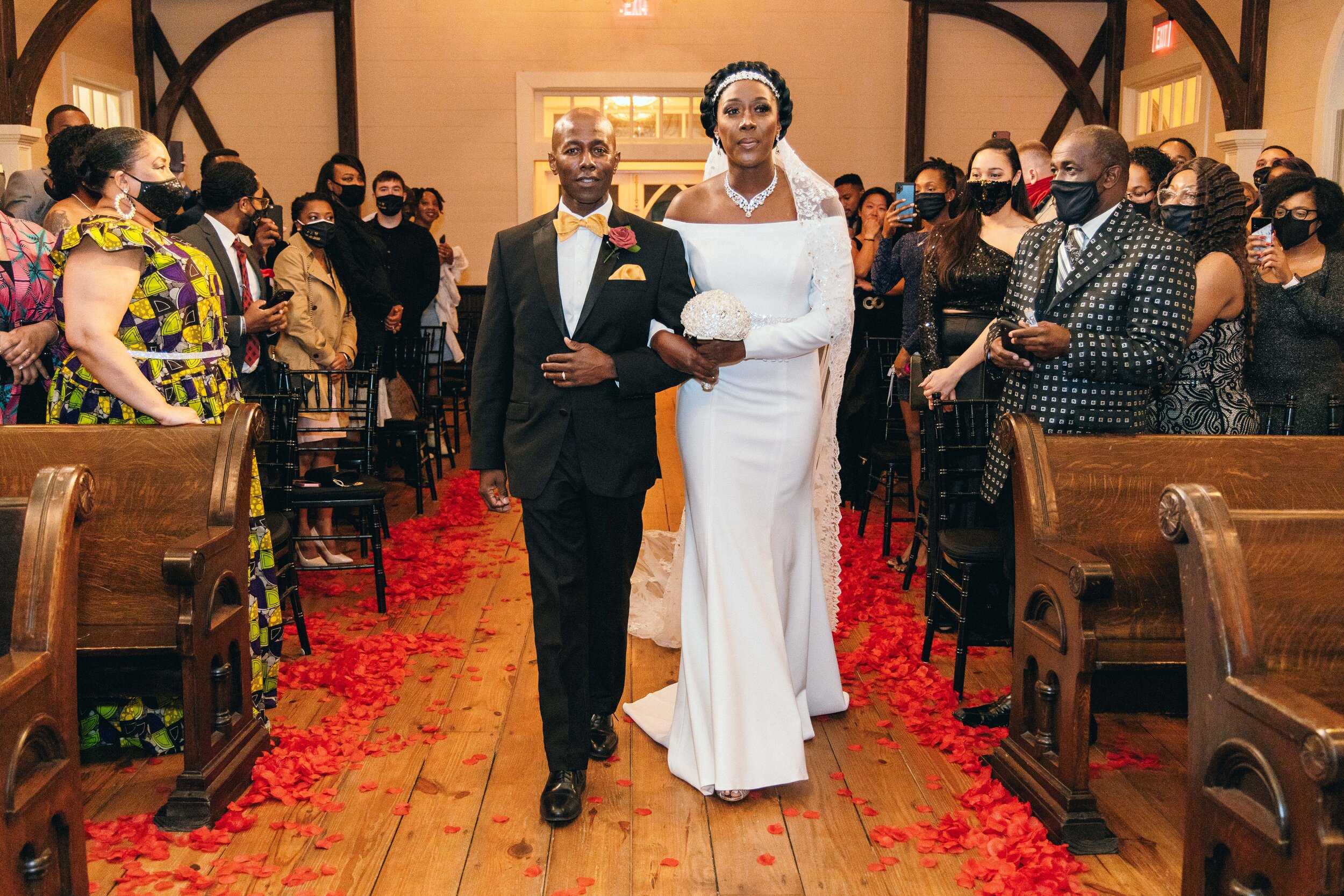
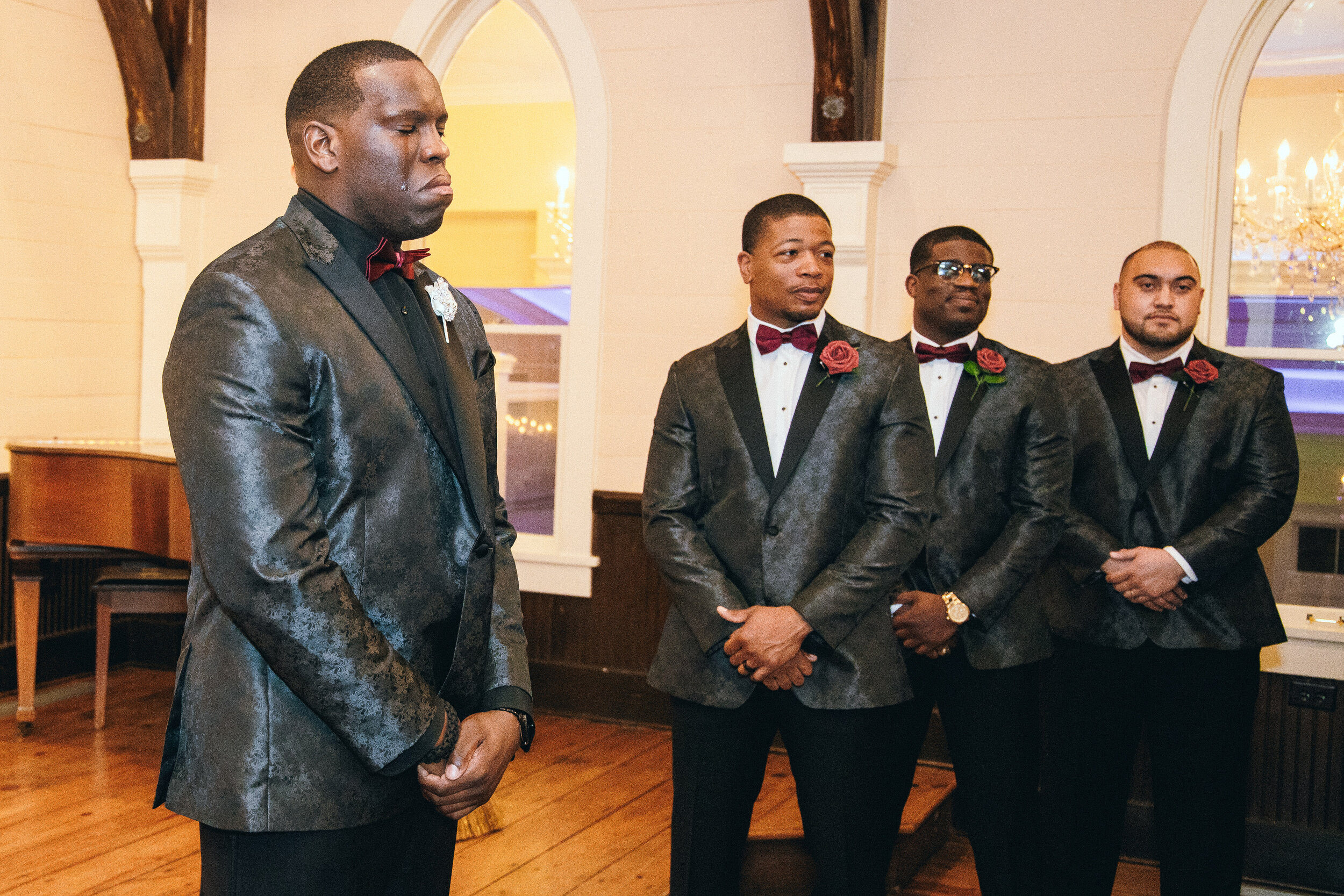
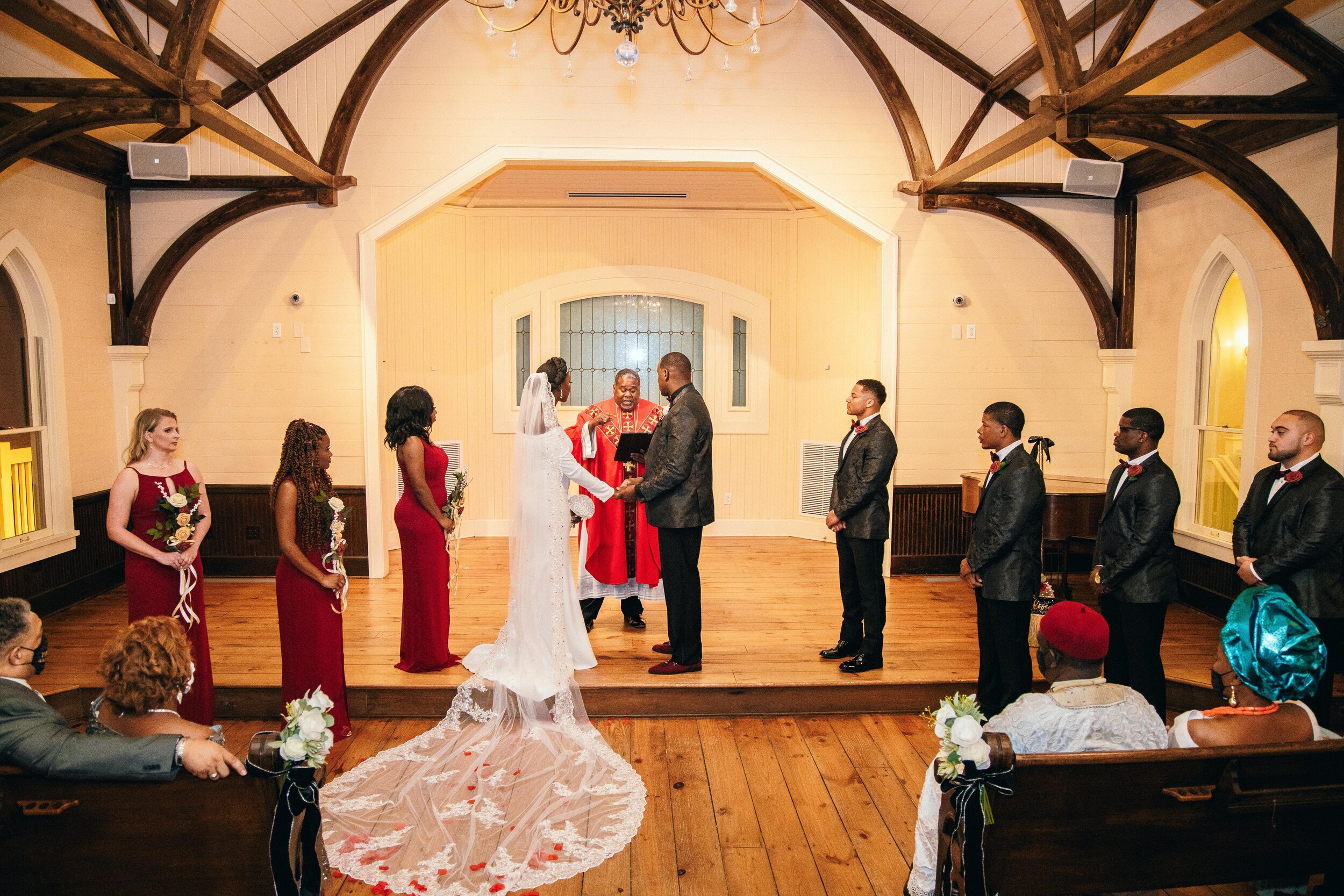
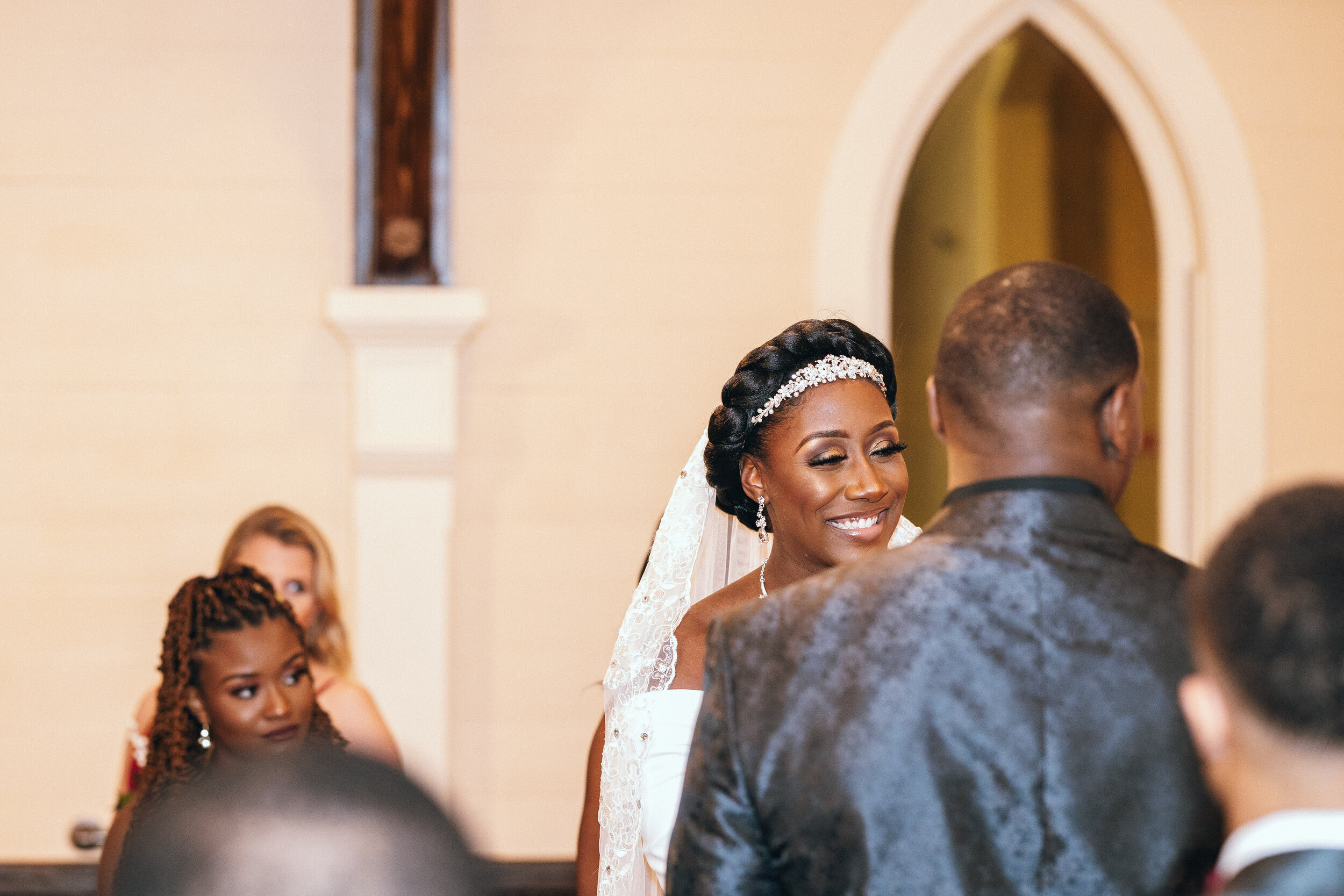
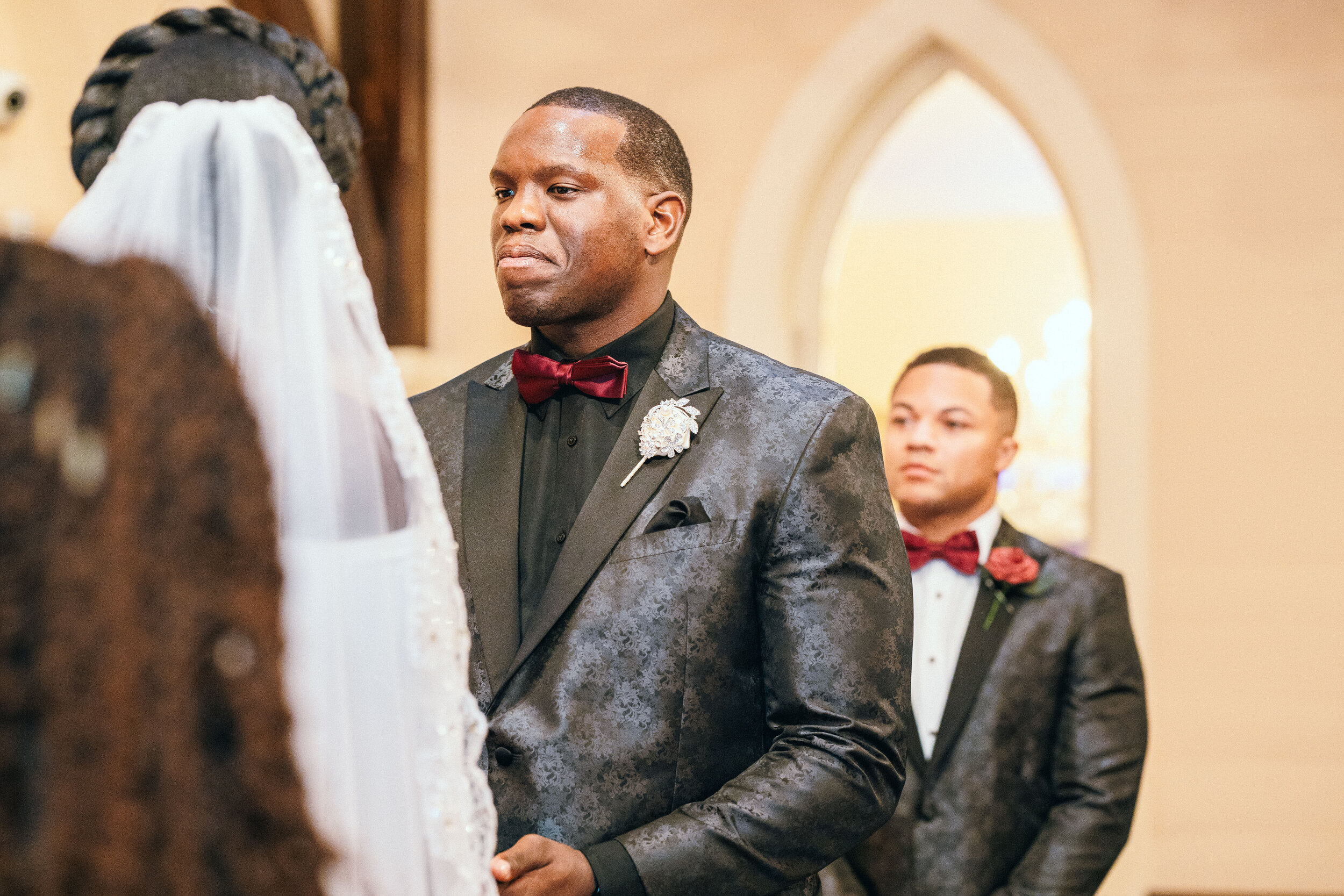
In an homage to their own Black identity and culture, the two ‘jumped the broom’ at the end of their ceremony, a symbolic act which dates back to the era of slavery in the United States when circumstances or law would not permit Black couples to be formally or legally married.
Ciara and Mike jumping the broom
After family and couples portraits, Mike and Ciara began their reception by sharing a first dance to Sunrise by Jaz Karis, followed by Mike dancing with his mother to A Song for Mama by Boyz 2 Men and Ciara dancing with her father to Ruben Studdard’s Flying Without Wings.
They then changed into traditional Nigerian wedding attire, made of fabric imported from Nigeria and sewn into the regalia by one of Mike's aunts. (They also wore matching white, black, and golden sneakers.)
Mike and Ciara in their Nigerian wedding regalia
"In Nigeria, the wedding usually takes, like, a week," Mike said. "It's a story told over many days." For their own wedding, Mike and Ciara instead walked through an abridged version of the traditional ceremonies: Ciara received a glass of wine from her father, symbolizing the fact that she was of age to find a partner. Then, she walked around the room, acknowledging other guests who symbolized the other people she met along her journey, before "finding" Mike within the crowd and sharing the glass of wine with him.
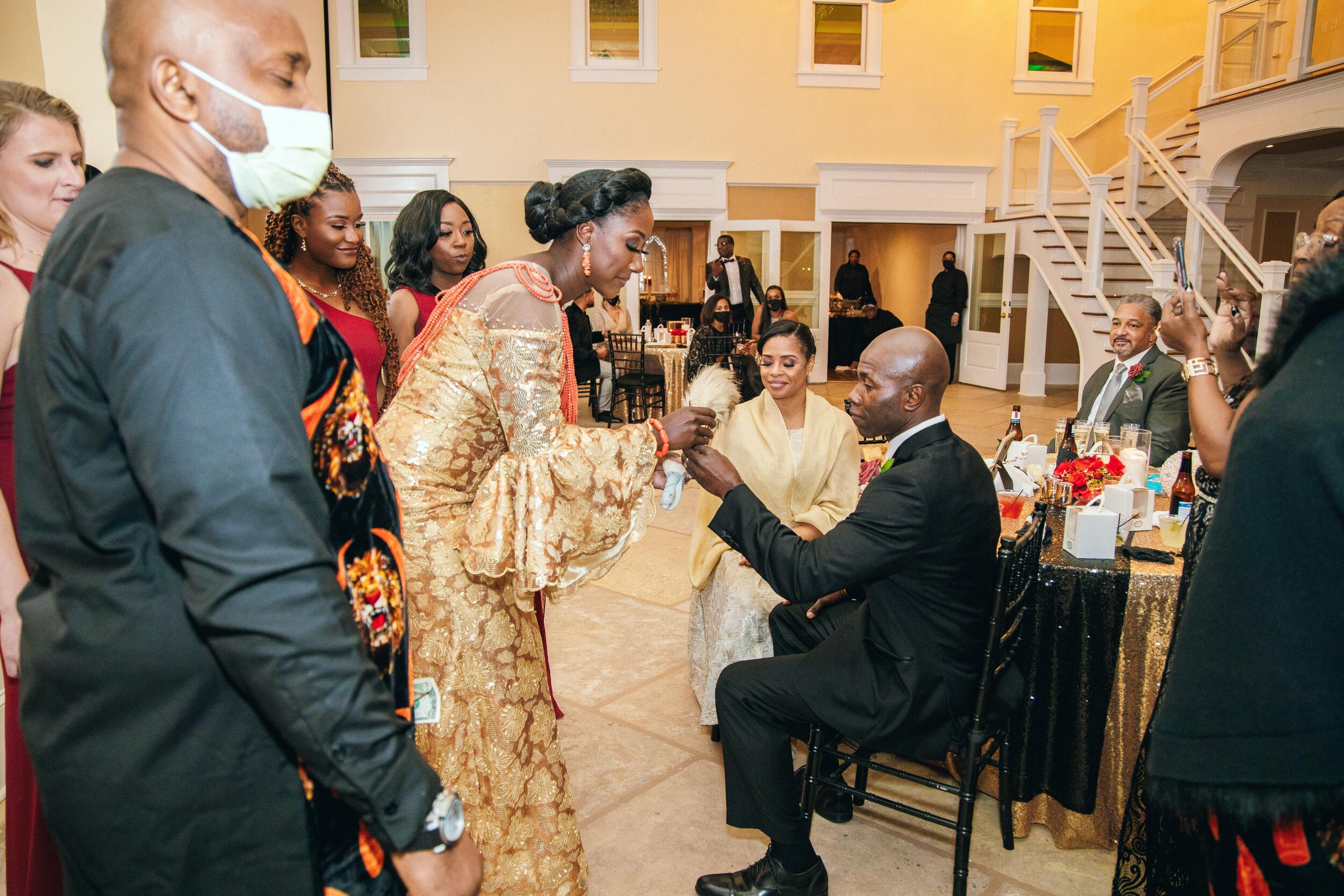
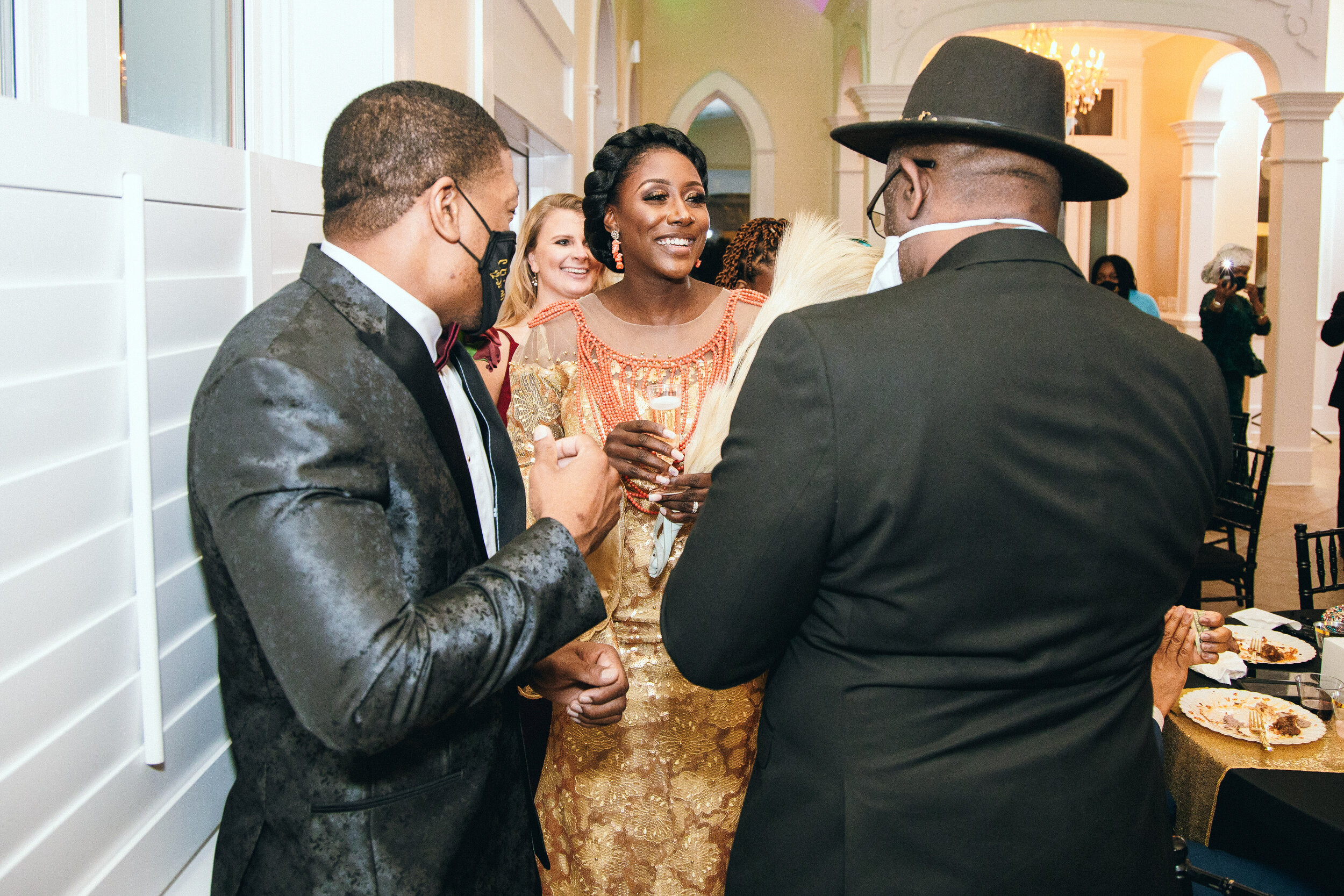
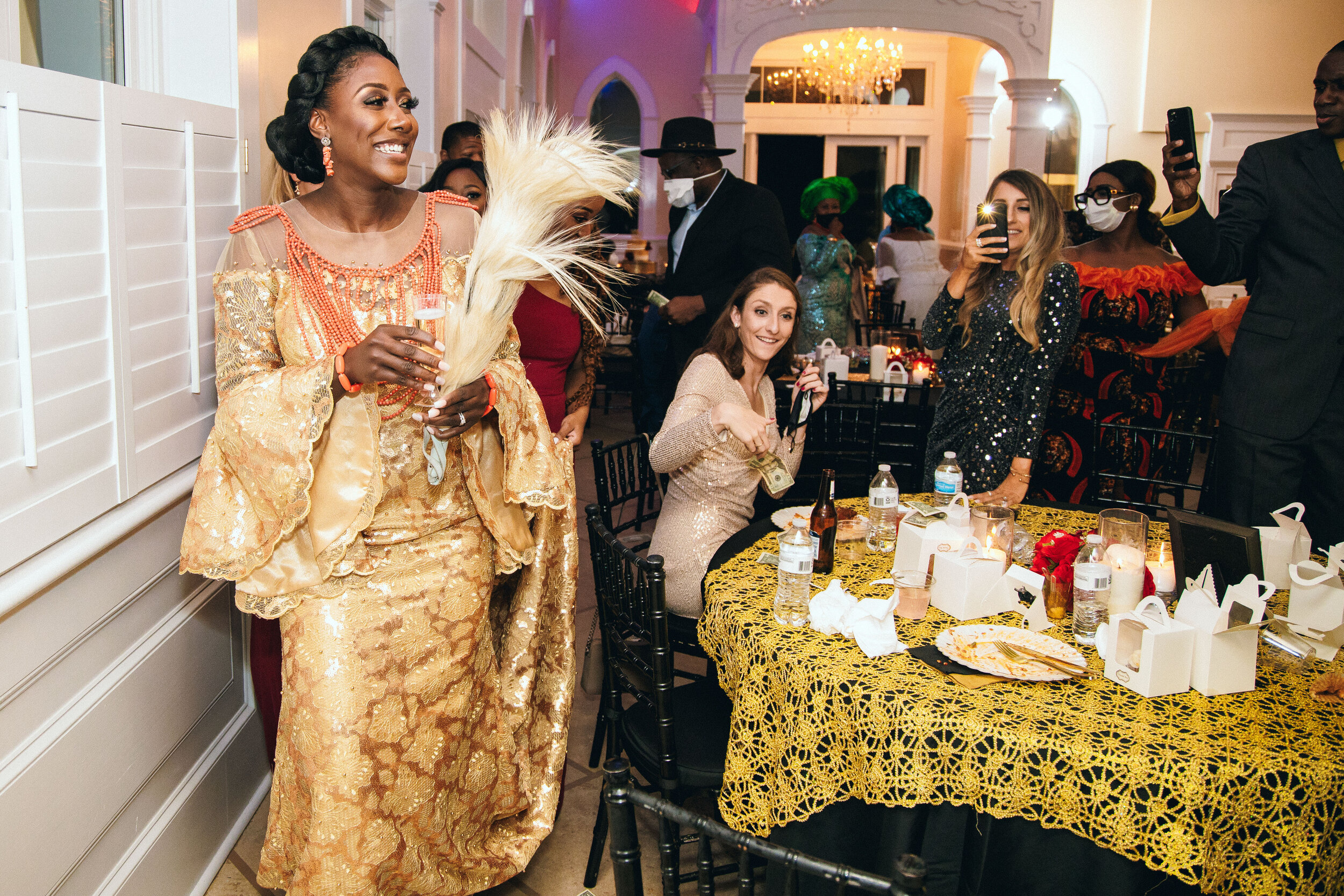
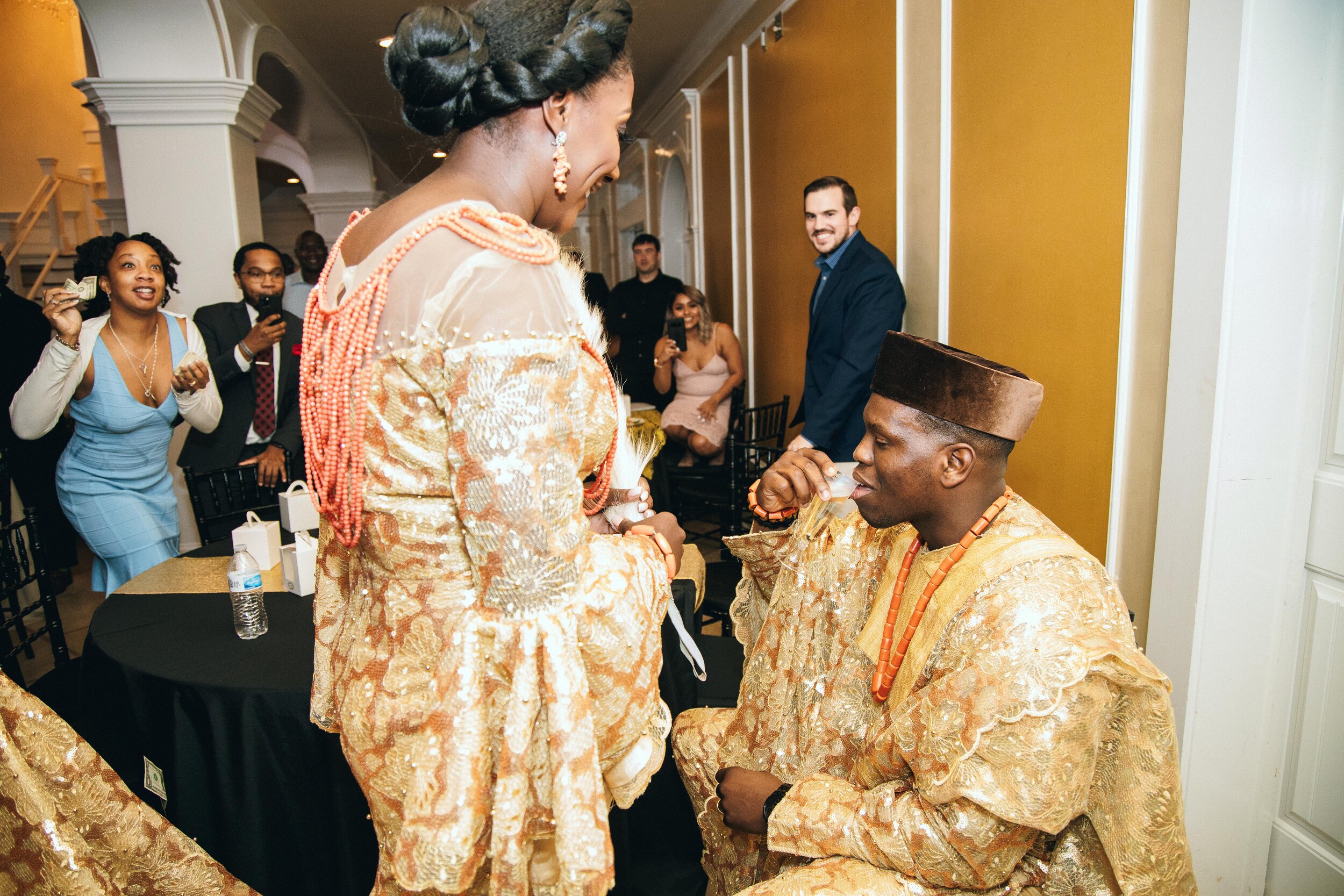
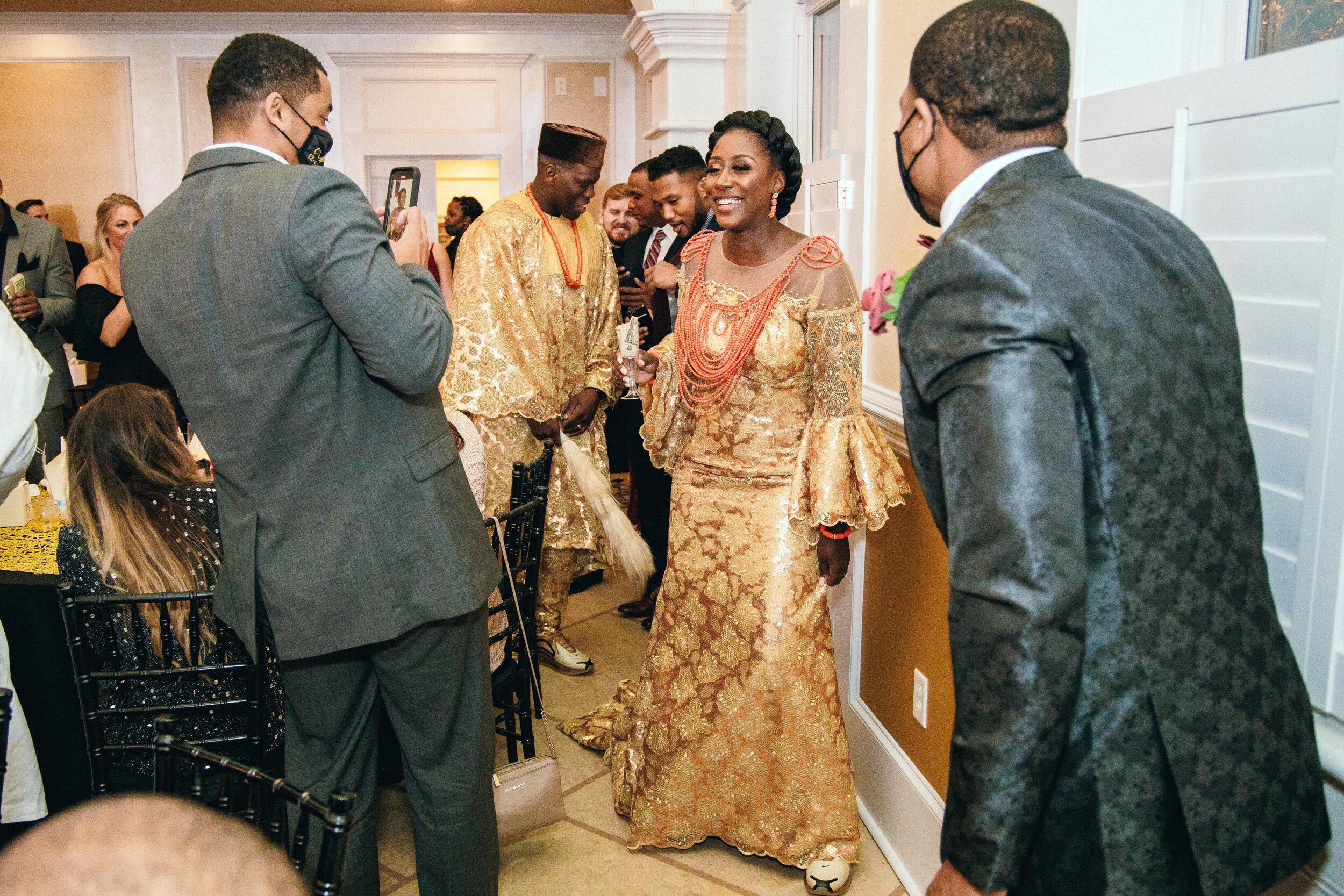
Then, she and Mike kneeled in front of Ciara's father to receive his blessing of their marriage, before doing the same with Mike's father. "That whole event took, like, 30 minutes, but if we were to do it fully it'd take hours," Mike said, seemingly grateful they'd been able to include the traditions in shortened form.
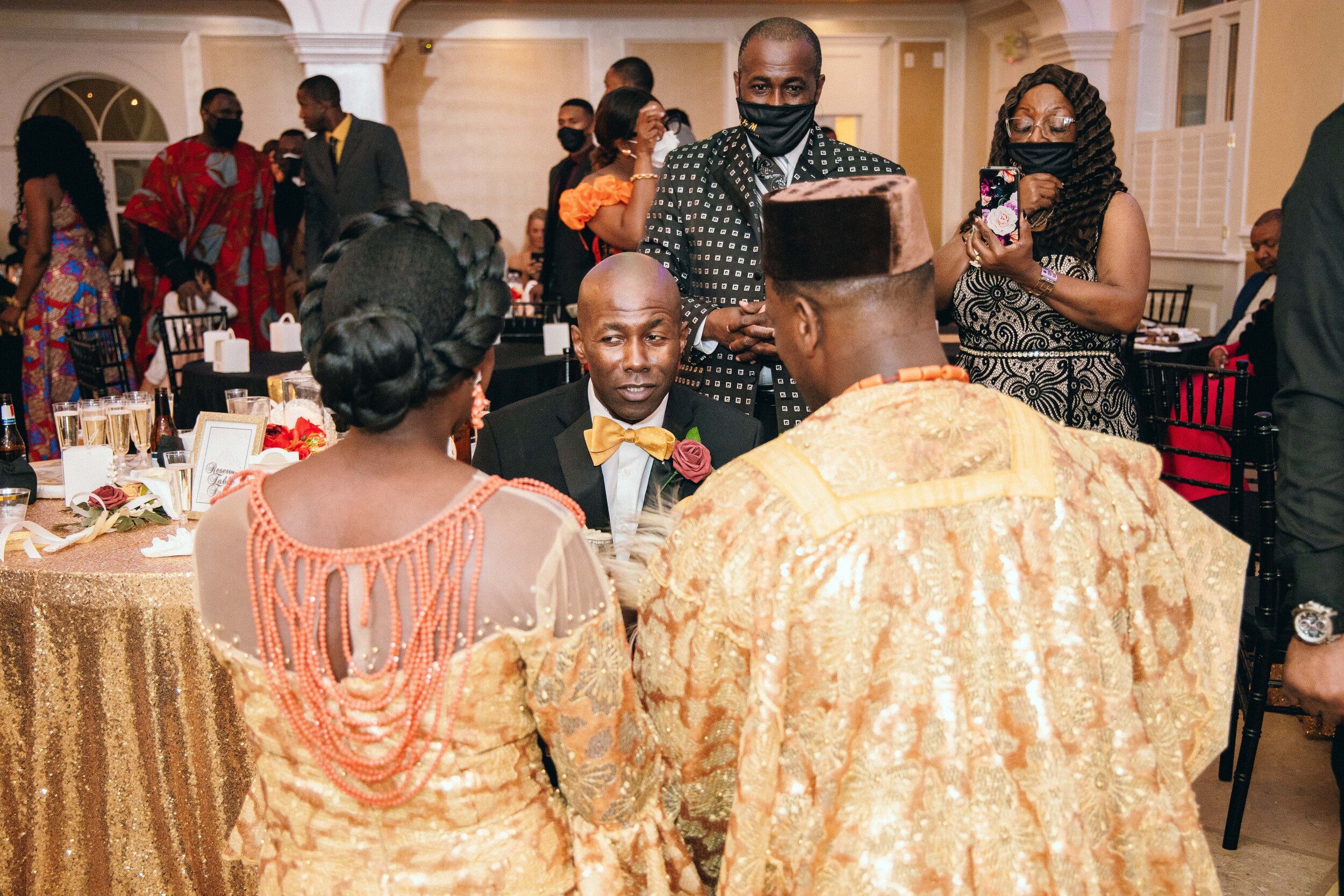
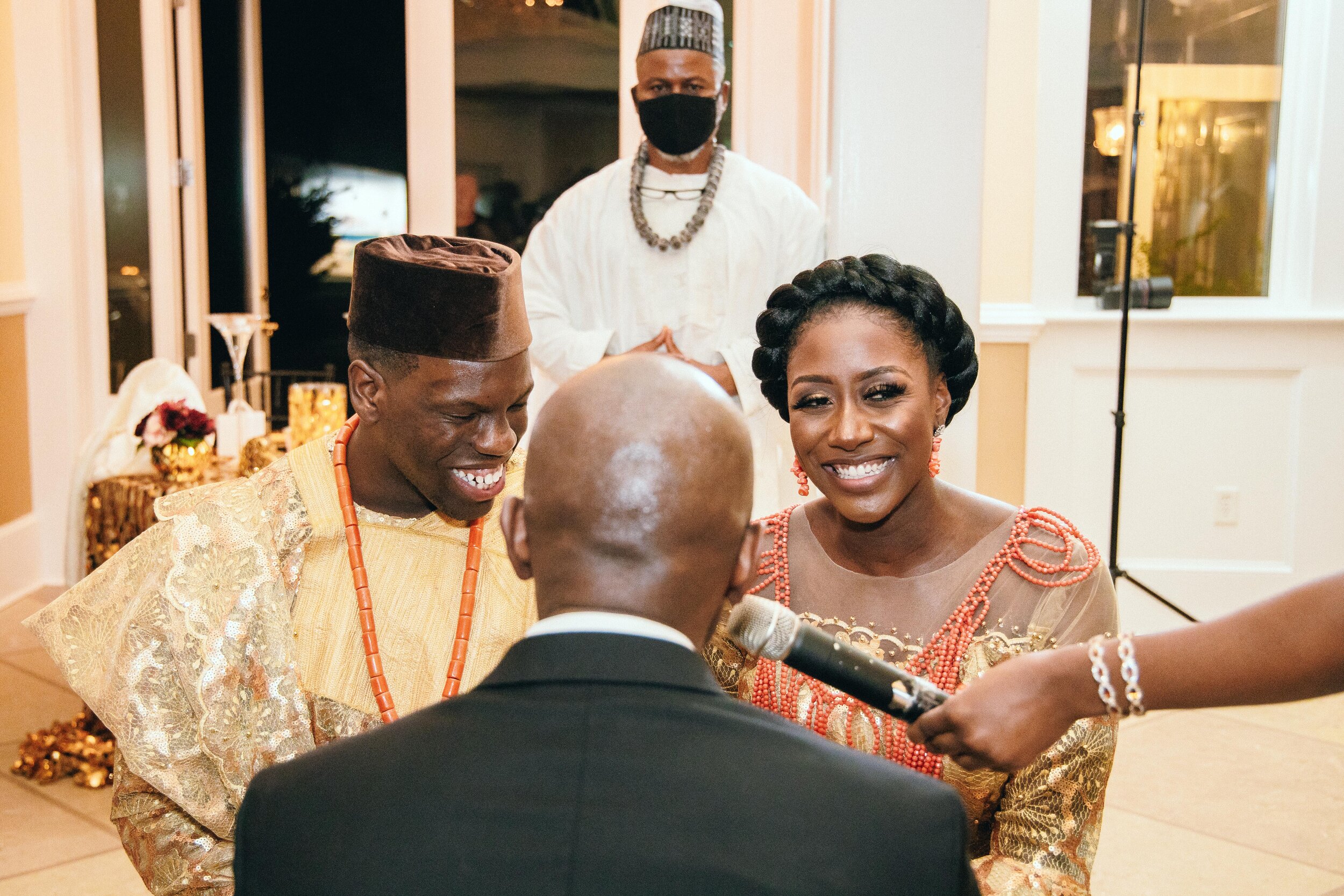
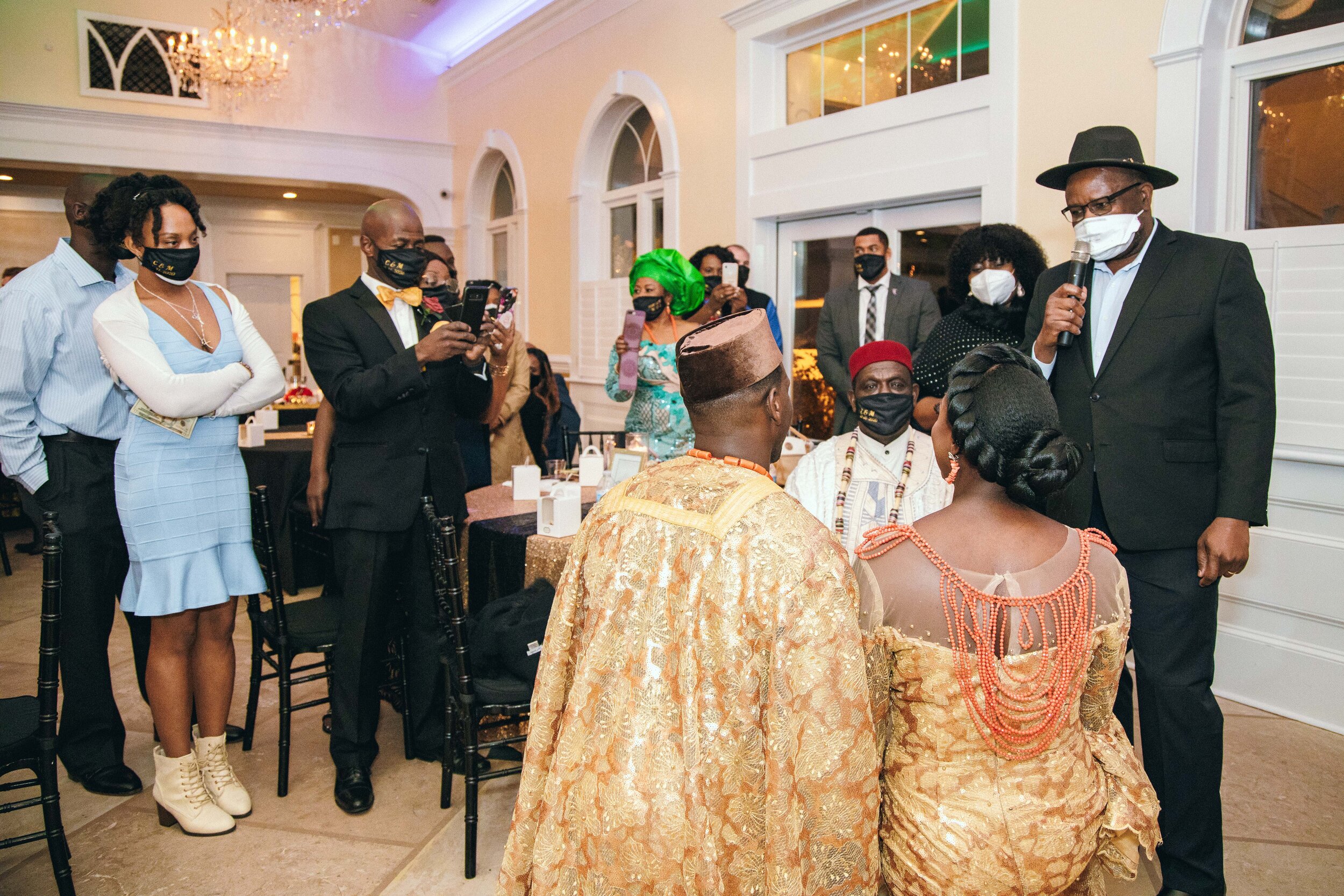
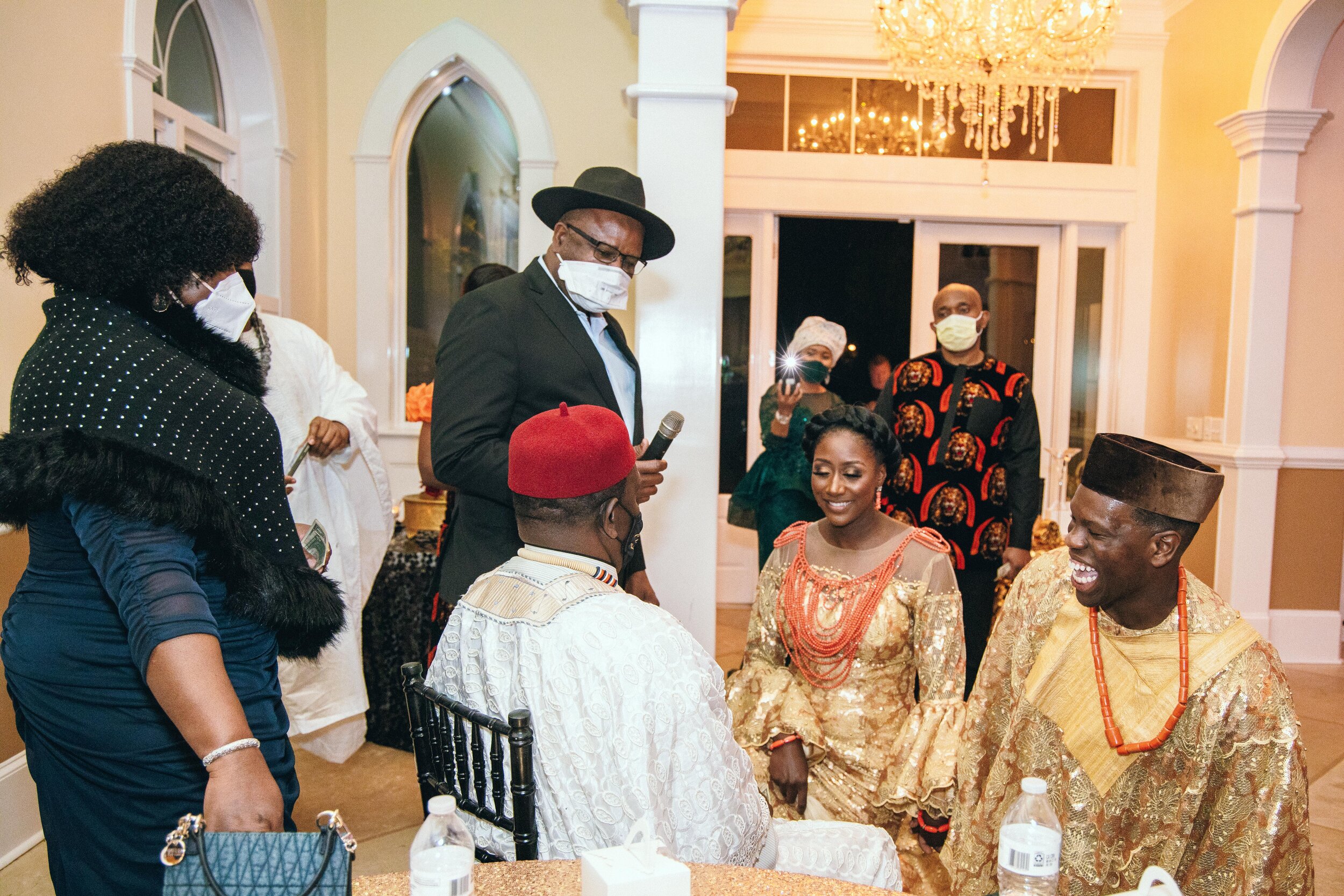
When I talked to Deyonna, Ciara's best friend from childhood, about the wedding, she described the emotions she and Ciara shared that morning. "Ciara just starts doing stuff with her hands when she's nervous," Deyonna said, "and so when she came into my hotel room to talk, she just was suddenly like, 'Let's make your bed!'" Ciara was clearly fidgeting, and Deyonna asked her why. "I'm like, What the heck? You're already married to him? What are you nervous about?"
For Ciara, the day meant the return of emotions from her and Mike's courthouse wedding in El Paso; when they hadn't had any family or friends around them; when she and Mike hadn't, honestly, spent that much time together yet; and when neither knew just how long it’d take to repeat that moment in front of their friends and family.
Above the area where Mike and Ciara held their reception reception was a small balcony, from which, if you were watching a few hours later as everyone rang in the New Year, you would've observed a few things: First, empty tables left unfilled by guests who decided, last minute, not to attend. But second, an unmistakable gratitude radiating from those who did attend; the gratitude between Ciara's father stepfather and father, acting like they were brothers; the gratitude of a sizable crew of West Point alumni reliving their college days and progressively losing their footing as they drank and danced; the gratitude Mike had while speaking with Glover’s family; the gratitude that a year as painful and isolating as 2020 could end so joyfully and surrounded by so much love.
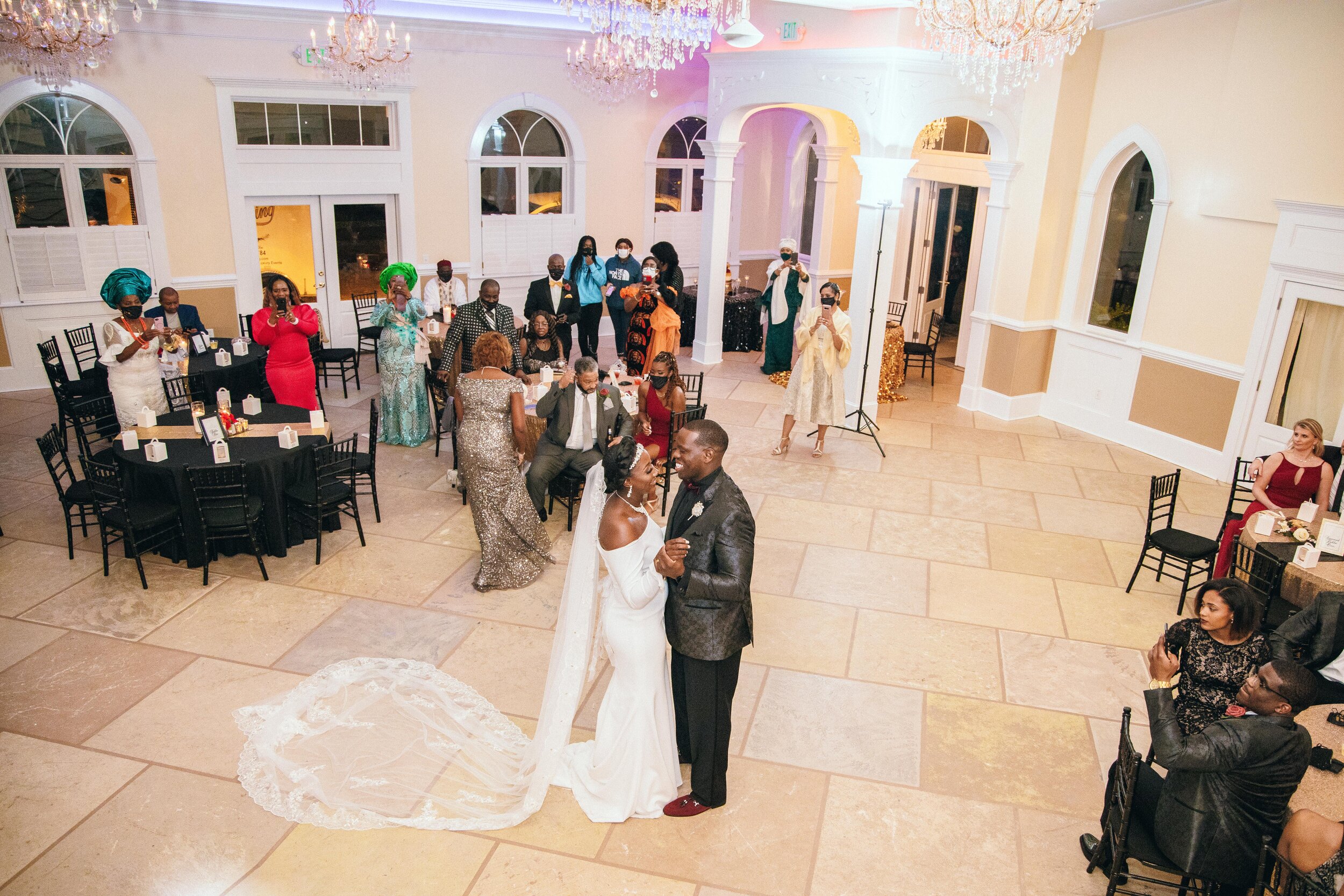
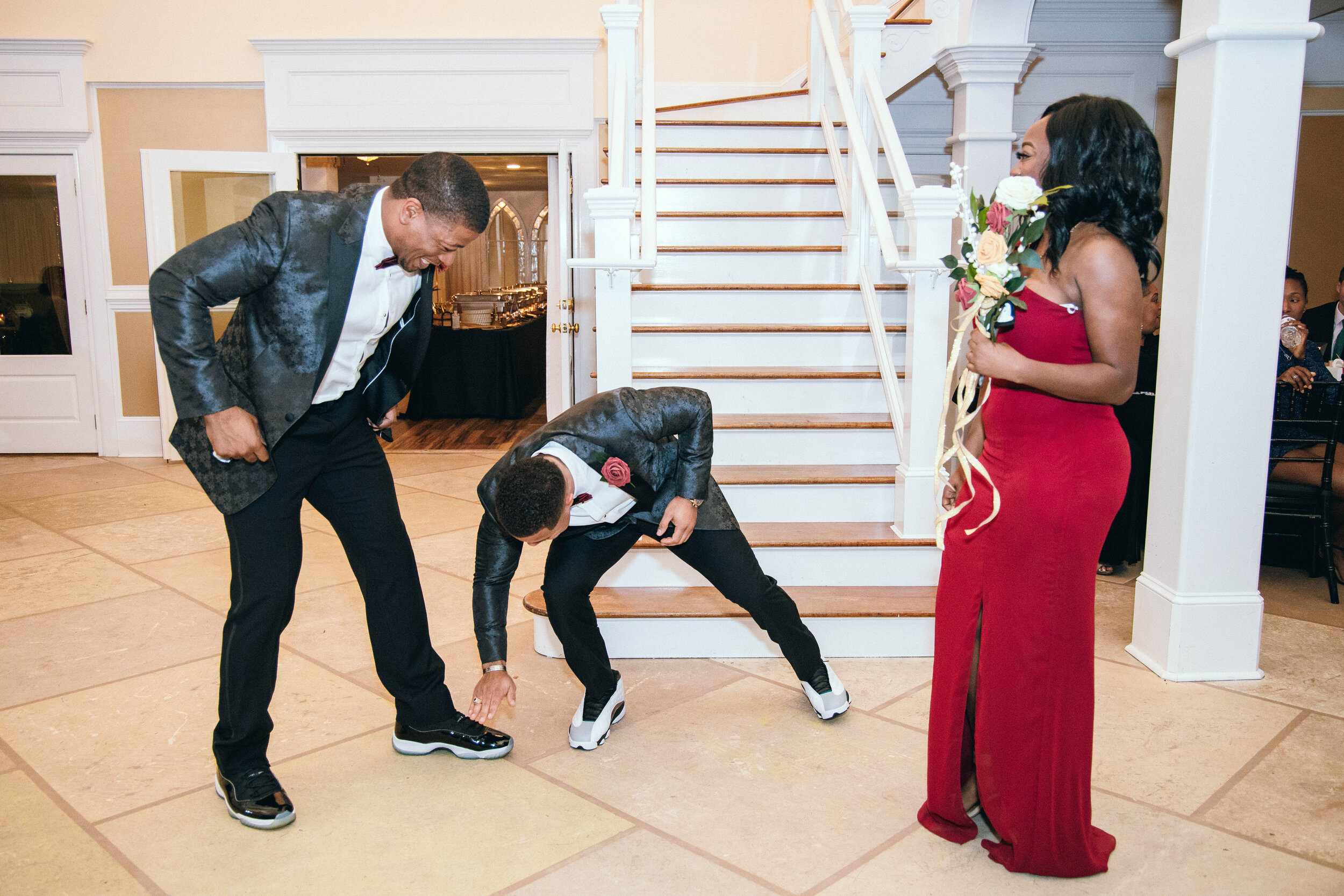
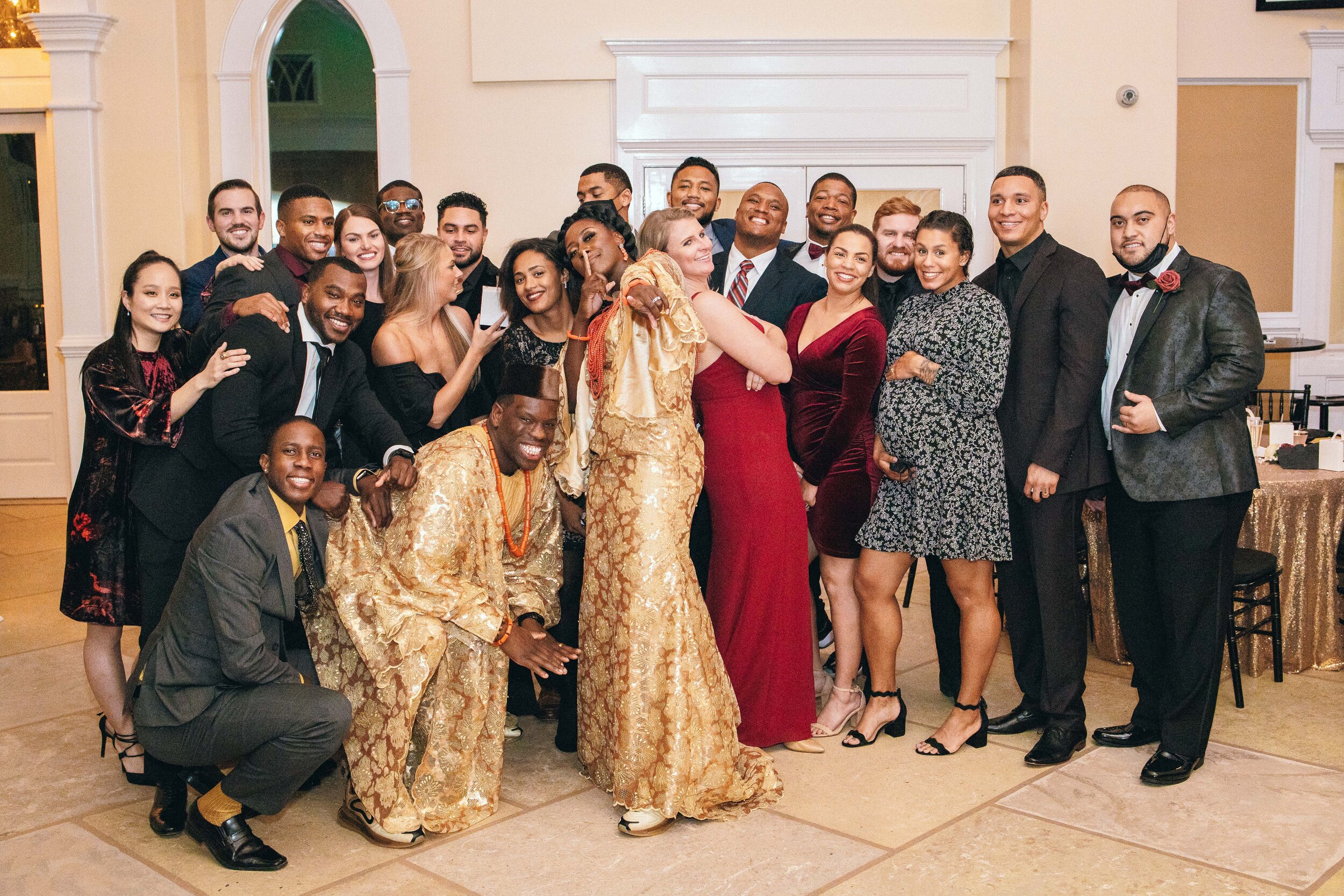
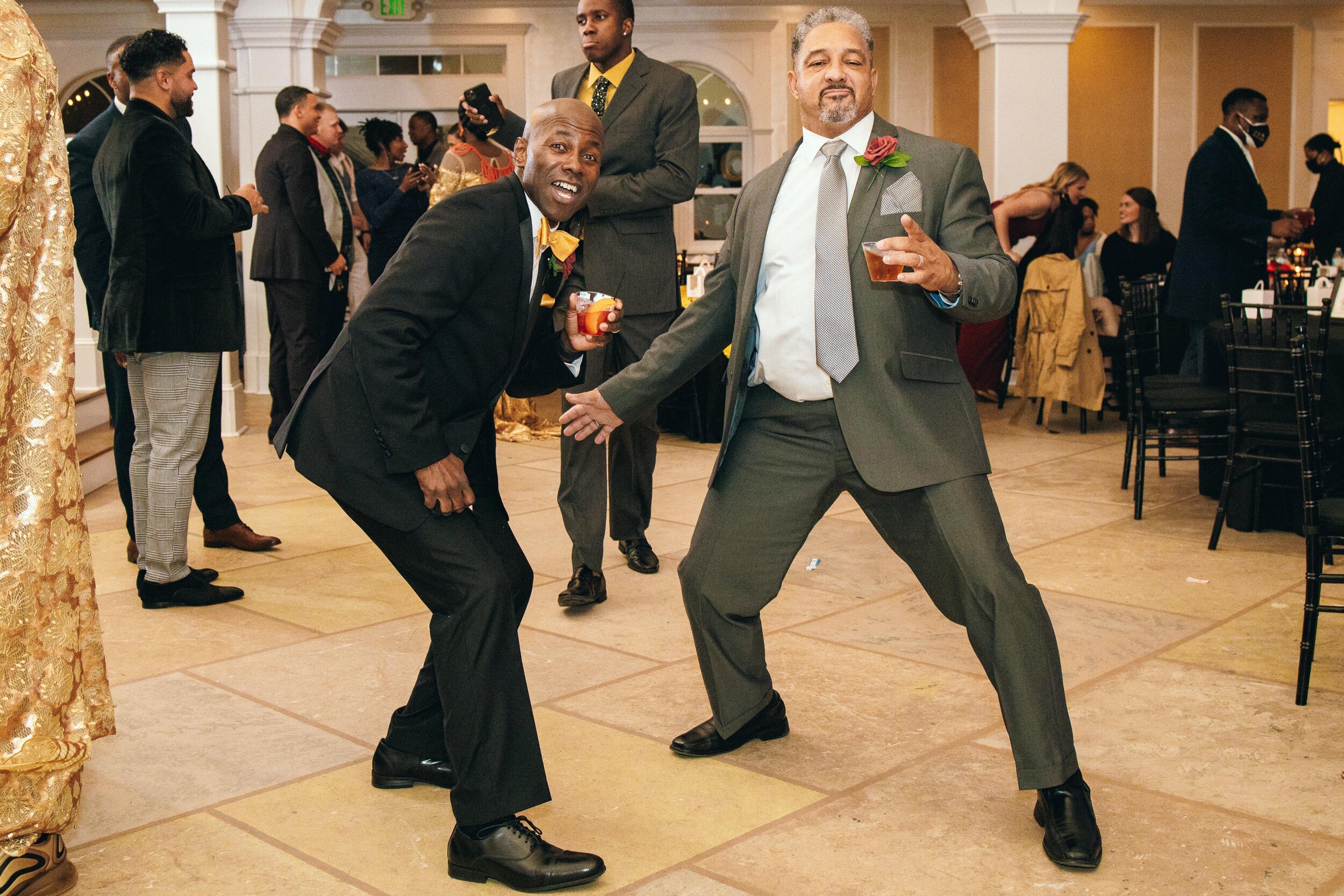
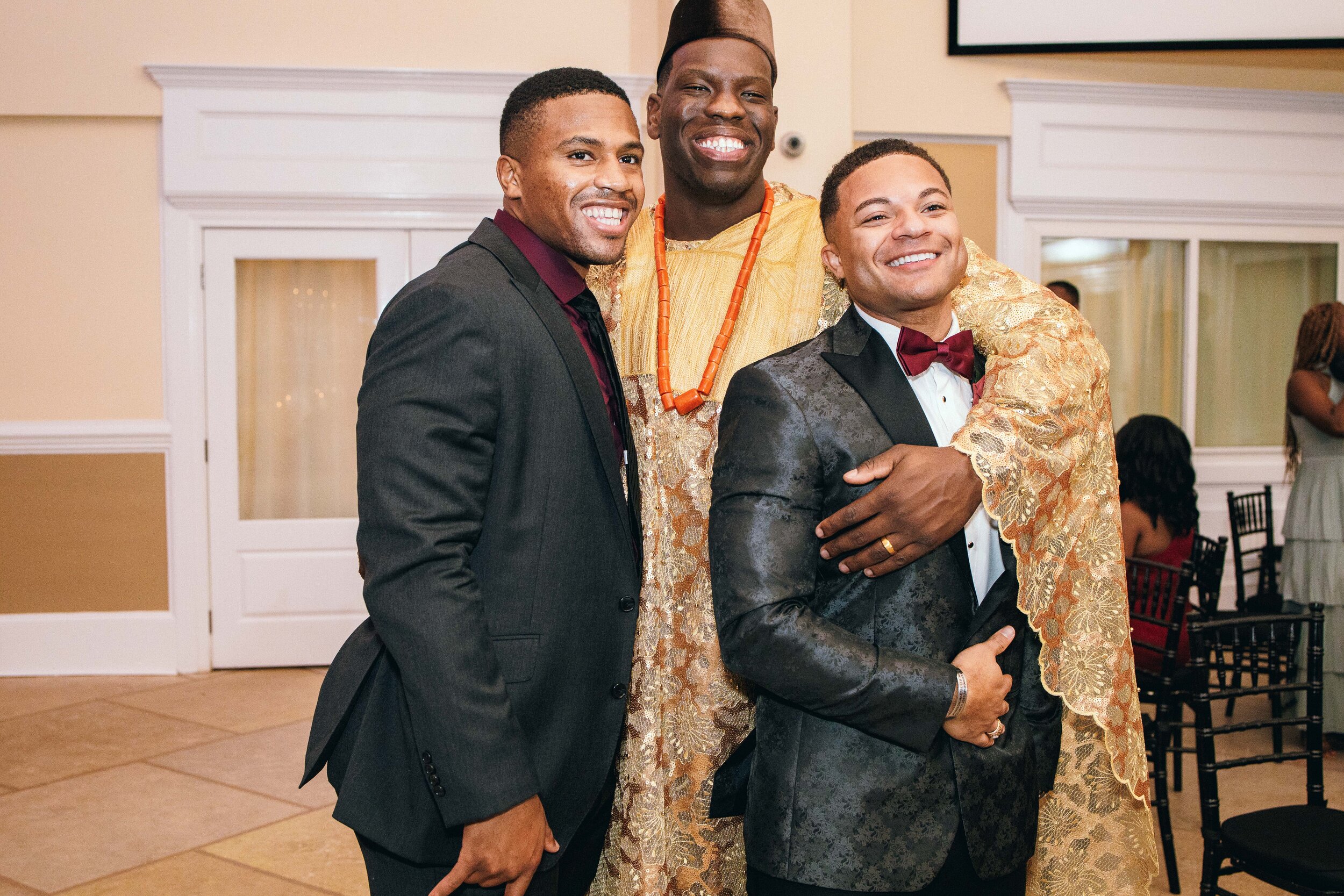
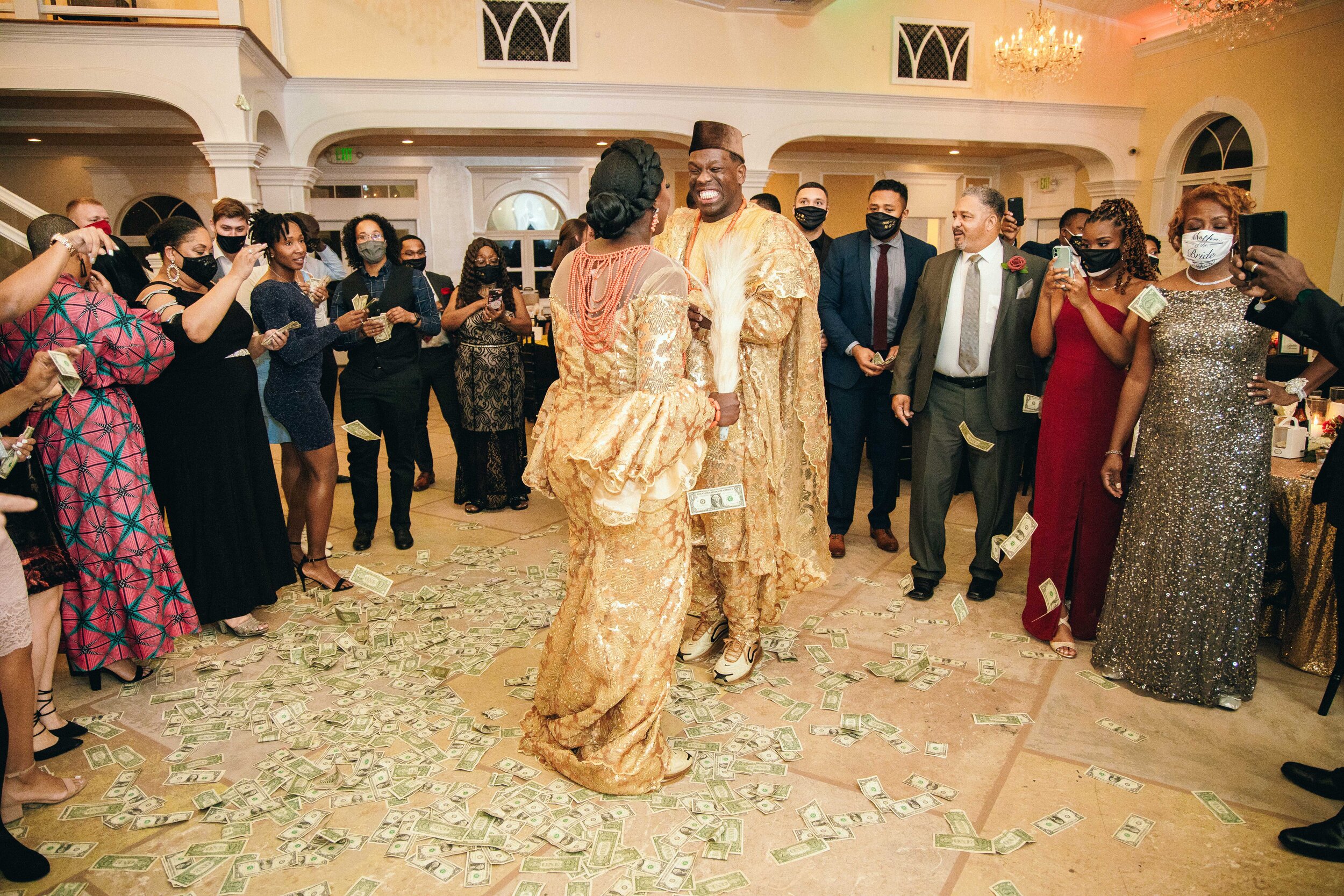
When I last talked to Mike and Ciara in-person, we met for lunch at a southern-style restaurant near Fort Sill in Lawton, Oklahoma. I was back at home with my parents for a month in-between weddings, and Mike and Ciara were living slower-paced lives while taking classes in preparation for their next promotions within the Army. "We wake up in the morning for Physical Training," Mike said to me, "have class all day, and then do assignments. But it's a lot more slow paced, and we have a lot more time than if we were in the Operational Force or deployed."
Mike has a practical habit of living in the moment and not placing too much stock in trying to force the future to bend to his will. "I like living in the present and enjoying the time that I have now," he told me. "My thinking is very, very short term, and I put my mind to what I'm doing right now and for the people around me.”
When I asked about his future ambitions, though, he cited goals as impressive as they were admirable—an MBA from Harvard, and a continued focus on helping other people, regardless of the industry he's in—before quickly anchoring the conversation back in his current life. "I've been blessed to have more positive things than negative happen to me in life," he said, "and I just focus on the present, which for me means having peace within myself and within my home, and being able to provide for my family.
Ciara, on the other hand, finds more comfort in seeing the future within a more defined outline. "I 110% believe in being in the present and spending time with people and having breaks," she said, "but I also believe that you can iron out time for thinking about the future.” She noted how the military, with its highly-defined processes for thinking about next steps, naturally encouraged at least a bit of long-term planning. “With the military, we do have to plan a bit. We have to rank where we'd want to be stationed next as a family, or if we want to continue to be promoted, or if we want to pursue more education. And if we get slapped in the face by life along the way, then we can be flexible and make the necessary adjustments. But at least we know the general direction we're going in."
That direction, for Ciara, will likely be taking the LSAT and applying for FLEP, or Funded Legal Education Program, where, similar to West Point, the Army would pay for Ciara's law education in exchange for a number of years of service within the JAG Corps, the Army's legal branch. She and Mike are also both interested in someday returning to West Point to give back to cadets in the same way their own alumni mentors gave to them.
Both expect their next station to be in Hawaii, where they'll likely stay for a few years, and where they hope they’ll be able to enjoy a sort of belated, extended honeymoon. They'll be placed into Command Queue and prepare for the responsibility and stress of commanding soldiers and being deployed.
For now, though, they're happy to appreciate the smaller joys in life, and are grateful to have been able to spend so much time together during the pandemic. "It's given us a lot of time to hang out and talk and really remember why we're best friends again," Ciara told me, as she smiled at Mike.
Her face lit up further as an extra basket of hot dinner rolls that she and Mike ordered finally arrived at our table. Mike drew a large smile as well, as he quickly plucked one from the basket, covered it in honey-cinnamon butter, and took a large bite; he and Ciara would only be in Oklahoma a few more weeks before they began their move to Hawaii, and felt no hesitation caving to a few final lighthearted splurges.
"It might not be good for us, but it's sure good to us," Ciara said, smiling and enjoying the moment as she also took a bite out of one of the fluffy, buttered rolls.



































